#Star Wars 1950 Version
Explore tagged Tumblr posts
Text
ℐ 𝒶𝓂 𝒹𝑜𝓌𝓃 𝒻𝑜𝓇 𝓌𝒶𝓉𝒸𝒽𝒾𝓃𝑔 𝓉𝒽𝒾𝓈 1950'𝓈 𝓋𝑒𝓇𝓈𝒾𝑜𝓃 𝑜𝒻 𝐒𝐭𝐚𝐫 𝐖𝐚𝐫𝐬...
#A.I.#A.I. Rendition#Star Wars 1950 Version#Han Solo#Luke Skywalker#Ben Kenobi (Obi-Wan)#Leia Organa (Princess Leia )#R2D2#C-3PO#Chewbacca#Lando Calrissian#Yoda#Darth Vader#Boba Fett#Jabba the Hutt#May the Fourth be with You#Star Wars
11 notes
·
View notes
Text

Over and Over Again
summary: I will fall in love with you, over and over again. No matter how long its been. characters: vampire! mattheo. reader warnings: mentions of death, blood, violence. word count: 1.5k
The moon hung low in the sky, its pale light casting a soft glow across the city. Mattheo leaned against the window, watching as the world continued on, indifferent to his existence. He had been alive for centuries, a vampire whose experiences spanned countless lifetimes, and yet, each passing day seemed the same. People came and went. Emotions, desires, loves, losses-they were all fleeting, like shadows in the night.
He had watched it all, experienced it all. Lovers who grew old and faded, friends who became strangers, and places that, no matter how often he returned, felt less and less like home. And through it all, he had remained the same. A figure untouched by time, a man who could never truly die, but could only watch as everything else crumbled away.
Yet, when he had met you, everything changed.
At first, it was nothing more than a passing curiosity. The way your laugh echoed in his mind long after you were gone. The way your touch lingered like a warmth that hadn’t been there before. Your voice, so familiar, so soft, as though he had heard it a thousand times before. He brushed it aside, attributing it to the pull of something unknown, something he could not name. But the more time he spent with you, the more undeniable it became. There was something in you-a presence, a pull that had always been there, just beneath the surface.
It wasn’t until the days bled into weeks, and weeks into months, that he started to see it. The similarities. The connection. The way your eyes would flash when you laughed, a kind of intensity that reminded him of another, of someone from another life-another form.
He was drowning in memories of you-but were close-but not this version of you. Not in this body. In other lifetimes. Other forms.
The first time he truly remembered was the 1830s. You had been a young woman living at the edge of a sleepy village, your hands always stained with ink and flowers. He had caught you in a field one afternoon, scribbling into a leather-bound journal, curls escaping your bonnet as the wind played with your skirts. You had looked up at him like you knew him. Like something ancient inside you recognized something ancient in him.
He didn’t speak to you then. He had been too afraid-of what he was, of what he wanted, of what he could do. And by the time he found the courage, you were gone. Taken by fever before your twentieth year.
The ache of that loss had lingered like smoke in his lungs.
Then in 1910. A boy this time. Mattheo had watched him recite poetry in a crumbling café on the riverbank. His voice was soft, but his words held weight-lines about stars and longing and a love that stretched across oceans of time. He had stared at Mattheo across the crowd like he was reading straight from his soul. And Mattheo knew. It was you again.
That boy had died in war. Buried beneath blood and mud and silence.
Then came the 1950s. A jazz singer in a smoky club downtown, barefoot behind the mic, a cigarette always in hand. Your laughter had been reckless, beautiful, wild. You had looked at Mattheo like he was a melody you couldn’t stop humming. He had almost turned you then. Almost reached for you in the alley after your last set, drunk on your scent, on your voice, on the echo of lives past.
But he hadn’t.
And once again, you were gone.
Every time your soul returned, Mattheo felt it like a ripple in the air, a pull in his chest. Something old, deep, and unrelenting. You never remembered him-not in the way he remembered you. But there was always something in your eyes. A flicker. A tilt of the head. The way you leaned in closer without knowing why. He’d told himself over and over that he should stay away. That this was some kind of cosmic curse. But he couldn’t.
And now, in this lifetime, you were here again. And he was so, so tired of losing you.
One evening, as the city beneath him slept, Mattheo found himself standing at the window, watching the soft glow of the streetlights below. His thoughts were tangled in the whirlwind of memories-his past, your presence, and everything in between. You had become more than just a part of his life; you were the missing piece, the one he had been searching for through all the years, the one who would return to him, no matter the form, no matter the body.
He felt you before you even entered the room. The faintest stir in the air, the softest footsteps against the floor. And then, there you were-standing in the doorway, looking at him with those same eyes that had haunted him for centuries.
“You’ve been distant lately. What’s wrong?”
Your voice was soft, careful. The same voice that had asked him to dance barefoot on the cobblestones in 1832. The same voice that had whispered, “I think I loved you before I even knew what love was,” in 1910. The same voice that had sung jazz under her breath in 1957.
Mattheo turned, his dark eyes locking onto yours, and for a moment, he allowed himself to breathe you in-the scent of your skin, the warmth of your presence. It was a comfort he had forgotten, the feeling of something that felt like home. He opened his mouth to speak, but the words stuck in his throat, the weight of the truth pressing against him. How could he explain this? How could he explain that you were his, and he was yours, that no matter how many lifetimes had passed, no matter how many centuries separated you, your souls had always been bound together?
“I’m sorry,” he whispered, his voice raw. “I’ve been thinking... about us. About everything.”
You walked closer to him, your eyes never leaving his, and placed your hand gently on his chest, where his heart should be. It pounded, though it hadn’t in centuries.
“What about us?” you asked softly.
He stared at you, feeling the pull of something deep within, something ancient and eternal. He reached out, cupping your face in his hands, his thumbs brushing across your skin. “I’ve known you before,” he said, his voice almost a whisper, as though speaking the truth aloud might break something fragile. “Not like this, not in this life, but in others. You’ve always been there. Always.”
Your eyes widened slightly, and you searched his face, looking for something-an explanation, a sign, anything that could make sense of the storm in his gaze. “What do you mean?”
He sighed, closing his eyes for a moment, as if summoning the courage to speak the truth. “I mean that your soul... I’ve known it for centuries. I’ve seen it take different forms, different lives, but it’s always you. Always. No matter where or when, your soul finds its way back to mine. Every time.”
His breath hitched, and for a moment, it felt as though the room itself had frozen. His past, his endless years of waiting, stretched out before him like an ocean of memories, and you were the lighthouse that had always called him home. He leaned forward, resting his forehead against yours, feeling the familiar warmth of your presence.
“I don’t want to lose you again,” he murmured. “I can’t bear it. Every lifetime, every moment, I’ve always known that you would find me. That we would find each other again.”
He kissed you then, a kiss that felt as though it was drawing upon all the years they had spent apart, the centuries of pain and yearning. And as their lips met, the world seemed to blur around them, time itself suspended in that single, perfect moment.
“I will always fall in love with you,” Mattheo whispered, his voice thick with emotion, his lips brushing softly against yours. “Over and over again. No matter how many lives we live, no matter how long it’s been, you’re mine.”
You closed your eyes, the truth of his words sinking into your heart like a seed taking root. You had known him before, in ways you couldn’t explain, in ways you couldn’t understand. And no matter what form your soul took, you would always find your way back to him. Always.
His voice full of love and certainty. “You always come back to me. Always.”
You smiled through the tears that threatened to spill, your hands reaching up to caress his face. “I’ll always be yours, Mattheo,” you whispered, your voice breaking with the weight of everything you were feeling. “I’ll always find my way back to you.”
And in that moment, as he kissed you once more, you both knew that this love, this bond, would never be broken. Not by time, not by life, not by death. You were his, and he was yours, forever.
#slytherin boys#slytherin#harry potter#hogwarts school of witchcraft and wizardry#slytherin aesthetic#my works#au!#mattheo riddle x reader#mattheo riddle#mattheo x you#mattheoxreader#mattheo x y/n#mattheo fluff#mattheo riddle smut#mattheo fanfic#mattheo riddle fluff#mattheo x reader#mattheo smut#vampire! mattheo#rizzler writes#festivalofaus#au event!#event
175 notes
·
View notes
Text
CARBONARA | KA12





pairing: kimi antonelli x f!girlfriend!brazilian!reader
plot: where kimi is a bit too much of a perfectionist when it comes to cooking.
warnings: narrated in first person (reader’s pov); female reader; brazilian/non-italian reader; pre-established relationship; Kimi being a little too obsessed with Italian cuisine; possible grammatical errors; english is not my first language :).
a/n: images taken from pinterest. this has been in my drafts for weeks 🙃 i didn't know if i wanted to post it or not, but I'm so happy with kimi’s pole 🥹 so i hope you like it. i got the whole recipe from the internet and yes, it's definitely different from the brazilian one, so i apologize if something is wrong or completely irrelevant 😘 (wc: 1k)
remembering that this is just fiction, all the people portrayed here have their own personalities and their own relationships.

The kitchen clock showed a little past five in the afternoon when Kimi announced, with all the seriousness in the world, that today he was the chef. And not just that—he was going to teach me how to make the real carbonara, “the ceal way,” his words, not mine.
And of course, I said yes. Not just because I loved carbonara too — even though I grew up with the Brazilian version that used heavy cream — but also because watching Kimi being all meticulous in the kitchen was a show in itself.
By that point, the Antonellis’ kitchen was a complete mess. Not a war-zone kind of mess, but a domestic, adorable chaos, where flour, grated cheese, and scattered peppercorns shared space with dirty spoons, a chopping board, and… Kimi. The very spirit of an Italian chef chasing a fifth Michelin star embodied in an eighteen-year-old boy who looked like he was taking this as seriously as he would a race weekend qualifying.
I was leaning against the kitchen counter, wearing a red apron with white polka dots that made me look like a 1950s housewife, watching Kimi move around the kitchen with the same agility and precision he had on a racetrack. But instead of finding the best racing line, squeezing the most out of the car, and managing tire wear, Kimi Antonelli was wearing a blue polka-dotted apron—matching mine, obviously—while choosing ingredients, repeating the recipe to himself every five minutes to make sure he didn’t forget anything, and slicing the bacon with almost comical precision.
“Now you,” he said, handing me the knife. “Same thickness and size.”
“Yes, chef.” I replied, straightening up and mimicking the same tone the contestants on cooking reality shows used.
I lowered the knife onto the slab of bacon, slicing my first cube under Kimi’s watchful gaze.
“That’s crooked,” Kimi murmured automatically, hands behind his back like a MasterChef judge, leaning in to examine my cutting board.
“You’re joking,” I looked at him, mock-offended. “I’m pretty sure I know how to cut bacon,” I muttered, turning back to the board and slicing another piece.
Beside me, Kimi gasped. He actually gasped. Like I had just sliced off one of his fingers or something. I looked at him and saw the most shocked and horrified expression I’d ever seen on his face. Well… maybe not the most. His reaction when I once told him it’s common in Brazil to put ketchup on pizza was still worthy of a horror movie.
Slowly, like he was about to disarm a bomb, Kimi reached out and took the knife from me. Still visibly shaken.
And I didn’t know whether to feel offended or burst out laughing.
“First, let’s start with the basics,” he said, sliding the cutting board closer to him… and further from me. “It’s guanciale, not bacon.” He pointed out, seriously… deadly serious… staring straight into my soul.
I had to bite the inside of my cheek to keep from laughing and just nodded, trying to match his seriousness.
“And second… this is terribilmente crooked,” Kimi said, pointing with the knife at the only two pieces of ba— guanciale I had cut. “It needs to be the perfect size and thickness so it doesn’t burn, but still gets crispy,” he explained, going back to cutting with the same intense focus as before… and officially taking over my task.
“You said I could help,” I muttered, crossing my arms and narrowing my eyes at him.
Kimi finished slicing the guanciale cubes in seconds. Practice really does make perfect. And as much as I hated to admit it, I could tell that two of the pieces were slightly uneven and larger than the rest… but only if you really squinted.
He picked up the board with the cubes and used the knife to slide them into the hot skillet… looking even more like a renowned, skilled and smug chef.
“I also said that if you wanted, you could just stand there… looking all gorgeous and perfect while watching,” Kimi said, flashing me that smile he knew exactly what it did to me. That cute smile that made the corners of his eyes crinkle and made me forget everything.
I felt my traitorous cheeks heat up and my heart race. The butterflies in my stomach came to life, and I tried my best not to show any of it.
“But I want to help,” I answered, keeping my expression as serious as I could.
Kimi saw what I was doing… and also saw I was failing miserably, because he just kept smiling and stepped closer, bending slightly to reduce the height difference between us, bringing his face closer to mine and… giving me a quick kiss on the lips, completely catching me off guard.
“You look so cute when you pout…” he murmured, brushing our noses together and smiling again…
God, that smile.
His scent…
Focus, Y/N!
I shook my head quickly, trying to ignore how fast my heart was pounding in my ears and how suddenly weak my knees felt.
“Kimi!” I protested, pushing him away, but he didn’t even flinch. He just laughed and stepped back on his own.
“Alright, alright,” he said, raising his hands in mock surrender with a playful look on his face. “Come on, you can take care of the guanciale.”
Kimi handed me the spoon he was using to stir the guanciale in the pan. I took it and smiled triumphantly, making him laugh. I moved closer to the stove and was instantly hit by the delicious smell of the meat frying perfectly in the skillet.
“Alright,” Kimi murmured, positioning himself behind me. His chest against my back. The warmth of his body against mine. He placed his hand over mine on the spoon, and for a second, the slight jolt from his touch almost made me drop it. “Are you sure you still want to help?” he whispered in my ear, then chuckled softly.
That teasing tone — even laced with that voice — snapped me back to reality.
“I’m sure.”
Kimi chuckled lowly and placed a quick, sweet kiss near the shell of my ear as a truce. I smiled, satisfied, and focused on my task. The meat sizzled in the pan, turning golden, and the smell was almost too good to be true. Kimi guided my hand, showing me how to stir the guanciale properly, and once my amateur technique seemed to finally meet his standards, he stepped back just enough to let me take over — but stayed close enough that I could still feel his warmth… and his eyes on me.
“Now, we can turn off the stove and let the residual heat do the rest,” Kimi said, and I turned the knob, extinguishing the flame. “And now, we move on to the sauce.”
I stayed there, watching every detail he pointed out. He explained how the fat from the guanciale would be used in the sauce, how the residual heat from the pasta would cook the egg yolk and cheese mixture… And then he stopped everything, grabbed a little box from the back of the fridge, and looked at me seriously.
“Special cheese?” I asked, curious, stepping closer.
“Family secret,” he replied proudly.
I raised an eyebrow, crossing my arms, intrigued.
“Family secret?”
Kimi nodded, unwrapping a piece of cheese carefully covered in parchment paper.
“Parmigiano is great. Pecorino, perfect. But this one…” He held up the cheese like he was presenting a sacred relic. “It’s a special, artisanal type.”
I stepped closer, fascinated. “And you’re just showing me? Your family’s secret?”
“Of course. You’re going to be part of it.” He said, as if it were obvious.
As if I’d asked something like “is the sky blue?”
As if us was a certainty.
And hearing that made me freeze for a second. My heart stopped. And then, of course, took off like it was racing off the grid.
Kimi blinked, realizing what he’d just said. His face turned as red as a tomato. His hand went up to scratch his neck and almost dropped the cheese.
“I mean… one day… if you want, like, someday, no pressure, you know? Not that I’m—”
I stepped closer, got on my tiptoes, and kissed his cheek, cutting him off.
“Then I better learn this right, don’t you think?” I smiled, making no effort to hide the heart eyes I probably had. “If I’m going to be part of the Antonelli family, I can’t mess up the family recipe.”
Kimi looked at me for a second, surprised by my response… and then smiled. A tender, half-relieved, half-in-love smile. The kind that melts away every doubt in the air.
We finished the recipe together. Kimi guided me as we mixed the yolks with the cheese and pasta water until it became that silky, golden cream. We tossed it with the pasta — al dente, of course — and topped it with the crispy, glistening guanciale. A final sprinkle of the secret cheese, and it was done.
We sat on the back porch with two deep plates and two glasses of red wine he’d discreetly “borrowed” from his dad’s cellar. The golden hour light bathed everything in a warm glow. Kimi still insisted on repeating three more times that this was real carbonara. I just laughed, shook my head, and told him fine — but deep down, I already knew.
This might not have been the carbonara my mom used to make.
But it was definitely my favorite now.
Because of the taste, of course.
And also because of the chef’s smile beside me.

#kimi antonelli x reader#kimi antonelli x female reader#kimi antonelli x you#kimi antonelli x y/n#kimi antonelli#ka12
123 notes
·
View notes
Text

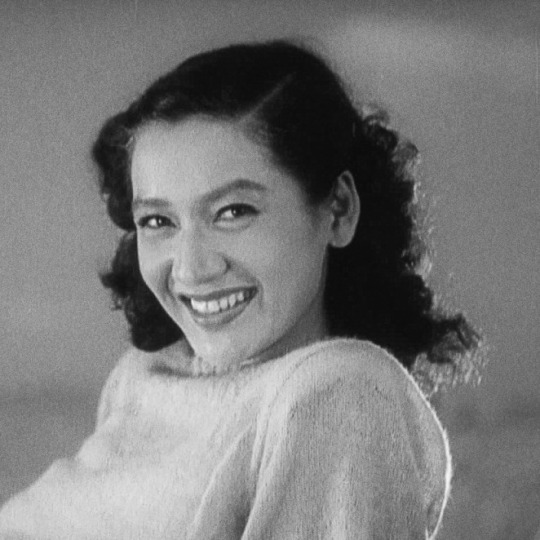
Propaganda
Yvonne De Carlo (Frontier Gal, The Ten Commandments, Casbah)— Although most famous for playing Lily Munster in The Munsters, Yvonne De Carlo had a successful movie career throughout the 1940s and 1950s, appearing in such films as “The Ten Commandments”, “Sea Devils” and two Munster movies later in life.
Setsuko Hara (Tokyo Story, Late Spring, The Idiot)— "'The only time I saw Susan Sontag cry,' a writer once told me, his voice hushed, 'was at a screening of a Setsuko film.' What Setsuko had wasn’t glamour—she was just too sensible for that—it was glow, one that ebbed away and left you concerned, involved. You got the sense that this glow, like that of dawn, couldn’t be bought. But her smiles were human and held minute-long acts, ones with important intermissions. When she looked away, she absented herself; you felt that she’d dimmed a fire and clapped a lid on something about to spill. Over the last decade, whenever anyone brought up her lips—'Setsuko’s eternal smile,' critics said, that day we learned that she’d died—I thought instead of the thing she made us feel when she let it fall." - Moeko Fujii
This is round 2 of the tournament. All other polls in this bracket can be found here. Please reblog with further support of your beloved hot sexy vintage woman.
[additional propaganda submitted under the cut]
Yvonne de Carlo:

The woman who brought Burt Lancaster to his knees.
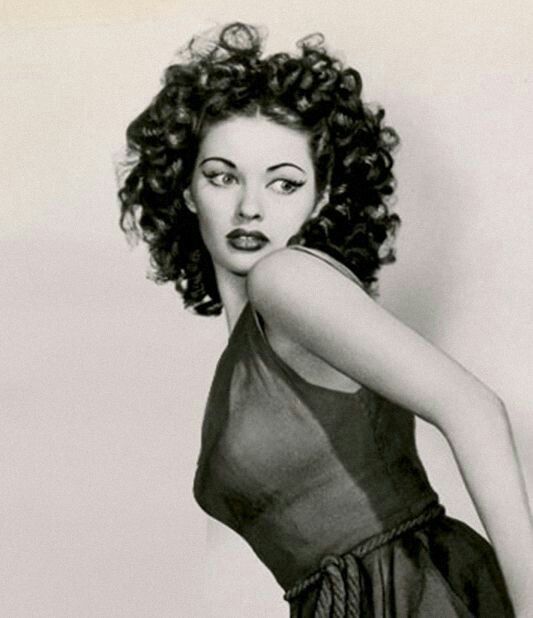
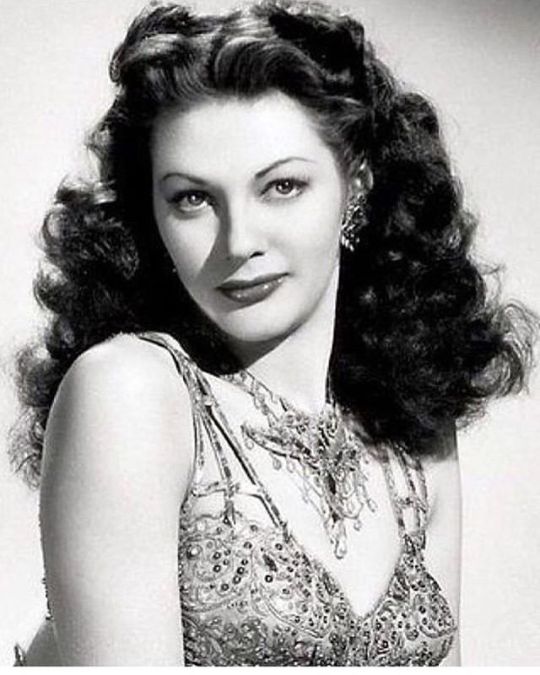
Setsuko Hara:

One of the best Japanese actresses of all time; a symbol of the golden era of Japanese cinema of the 1950s After seeing a Setsuko Hara film, the novelist Shūsaku Endō wrote: "We would sigh or let out a great breath from the depths of our hearts, for what we felt was precisely this: Can it be possible that there is such a woman in this world?"
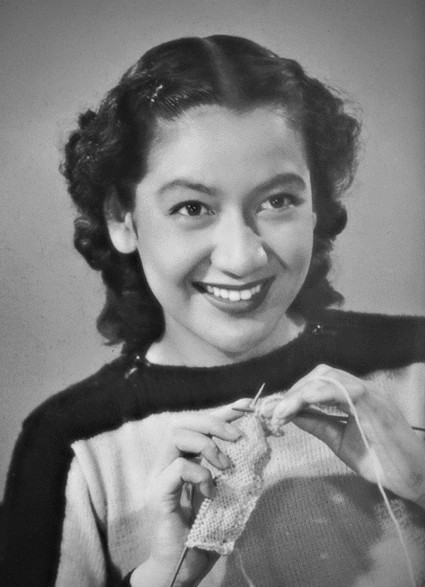
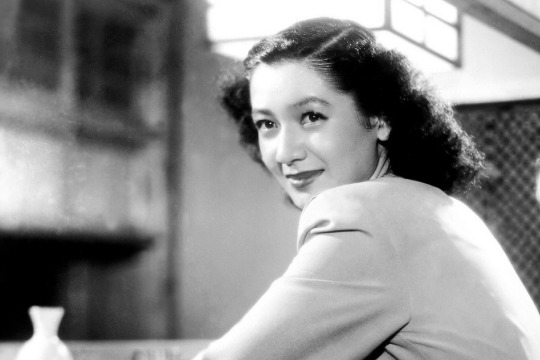
One of the greatest Japanese actresses of all time!! Best known for acting in many of Yasujiro Ozu's films of the 40s and 50s. Also she has a stunning smile and beautiful charm!
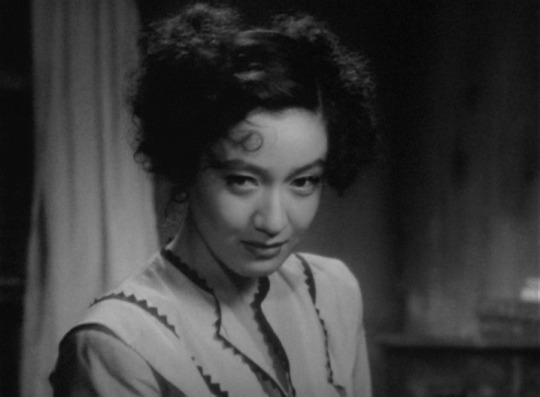
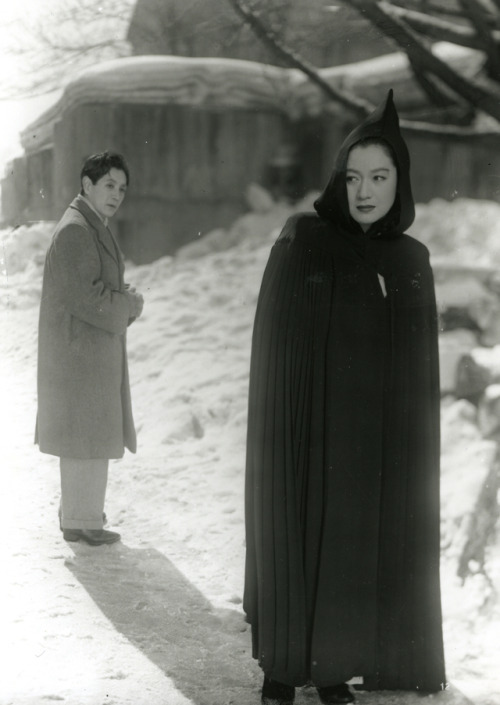

Linked gifset
Linked gifset 2
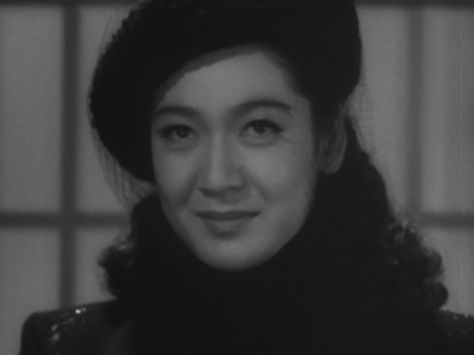
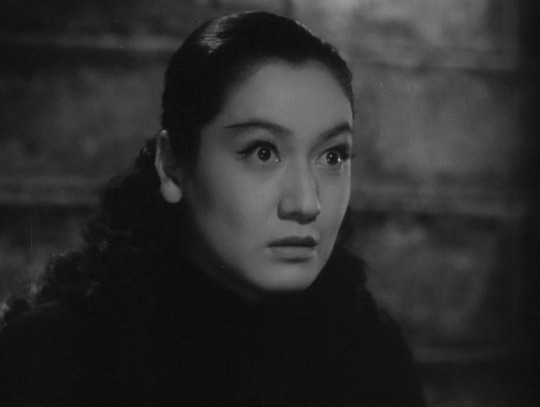

She's considered by some to be the greatest Japanese actress of all time! In Kurosawa's The Idiot she haunts the screen, and TOTALLY steals the show from Mifune every time she appears.

"No other actor has ever mastered the art of the smile to the same extent as Setsuko Hara (1920–2015), a celebrated star and highly regarded idol who was one of the outstanding actors of 40s and 50s Japanese cinema. Her radiant smile floods whole scenes and at times cautiously undermines the expectations made of her in coy, ironic fashion. Yet her smile's impressive range also encompasses its darker shades: Hara's delicate, dignified, melancholy smile with which she responds to disappointments, papers over the emotions churning under the surface, and flanks life's sobering realizations. Her smiles don't just function as a condensed version of her ever-precise, expressive, yet understated acting ability, they also allow the very essence of the films they appear in to shine through for a brief moment, often studies of the everyday, post-war dramas which revolve around the break-up of family structures or the failure of marriages. Her performances tread a fine line between social expectation and personal desire in post-war Japan, as Hara attempts to lay claim to the autonomy of the female characters she plays – frequently with a smile." [link]

Leading lady of classic Japanese cinema with a million dollar smile
Maybe the most iconic Japanese actress ever? She rose to fame making films with Yasujiro Ozu, becoming one of the most well-known and beloved actresses in Japan, working from the 30s through the 60s in over 100 hundred. She is still considered one of the greatest Japanese actresses ever, and in my opinion, just one of the greatest actresses of all time. And she was HOT! Satoshi Kon's film Millennium Actress was largely based on her life and her career.
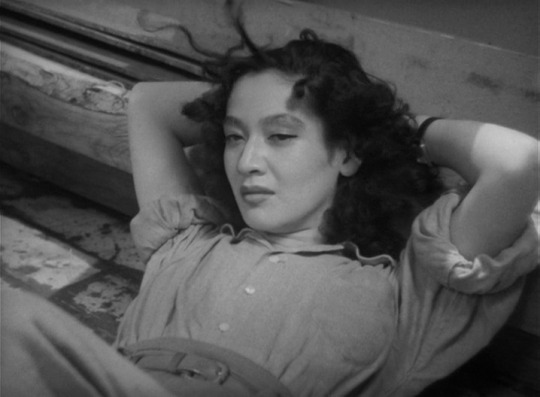
376 notes
·
View notes
Text
British-Mandate Palestine in Land of Black Gold, 1939-1950
The story that would become Tintin in the Land of Black Gold did not only undergo one of the most turbulent publication histories of any Tintin album, it was also was subject to some of the greatest revisions. In both cases, real-life events were to blame: the Second World War cut it off prematurely, and the revisions stemmed from Hergé's original decision to embroil Tintin in the conflict in Palestine during British mandate rule. Over the years, what promised to be a specifically politically engaged album like The Blue Lotus or King Ottokar's Scepter was transformed into a more generalized parable about the power of access to oil, and the earlier versions have been relegated to archive editions of the series.
Originally Black Gold was the story that followed King Ottokar's Scepter in Le Petit Vingtième; this first incomplete version was not collected in an album. After Prisoners of the Sun finished, Hergé returned to the story for the Journal Tintin, redrawing and completing it. That version did become an album, in 1950, and stood for twenty years until Methuen, the British publisher of Tintin, requested that the story be overhauled. The publisher claimed that the references to the conflict preceding the declaration of the state of Israel were too outdated for the then-current reader; I also suspect they preferred that their audience not be reminded of that period of British imperial history. However it may be, Hergé agreed, and a new, scrubbed version, the one published today as the 15th album of the main series, was released in 1971.
This post tracks references to Palestine and the depiction of conflict there across three serial versions of Black Gold and the 1950 album. When possible (which is not often), I include some analysis why certain changes may have been made.
First serial version in Le Petit Vingtième, Sept. 28, 1939-May 9, 1940 (incomplete)
(My main source for historical information is the Encyclopedia Britannica.)
After the defeat of the Ottoman Empire at the end of the First World War, its territories in the Middle East were divided between victorious Britain and France despite the resistance of regional leaders who sought an independent state. At the same time, the 1917 Balfour Declaration had expressed some support for the Zionist project of establishing a home for the Jewish people on Palestinian land. In 1922, Britain took administrative control of Palestine under the authority of the League of Nations in a decision that incorporated the Balfour Declaration's promise of a "Jewish National Home." This, too, was opposed by the native Arab people and their leaders, who rejected the Zionist claim to the land and still agitated for independence.
At the time when Hergé was writing Black Gold, the tension between the three parties in Palestine had flared into the 1936-1939 Arab Revolt. Nazi persecution of European Jews had greatly increased migration to Palestine, and Zionists were calling for an independent Jewish state there; Palestinian Arabs saw large-scale Jewish immigration and especially land transfers as an existential threat since the establishment of the mandate, resented the lack of representation they had in the governing of the territory, and still sought independence as an Arab state; and the British, having tried variously and unsuccessfully to please both sides by restricting or raising immigration and proposing new council structures, found themselves the target of both. While the fighting was mainly British attempts to quell the rebelling Arab population, radical Zionist organizations were also carrying out attacks on Arabs and, to a lesser extent, the British. Especially relevant to Black Gold, as will be seen below, is the fact that a common strategy of the Arab fighters was to blow up the pipeline leading to Haifa.

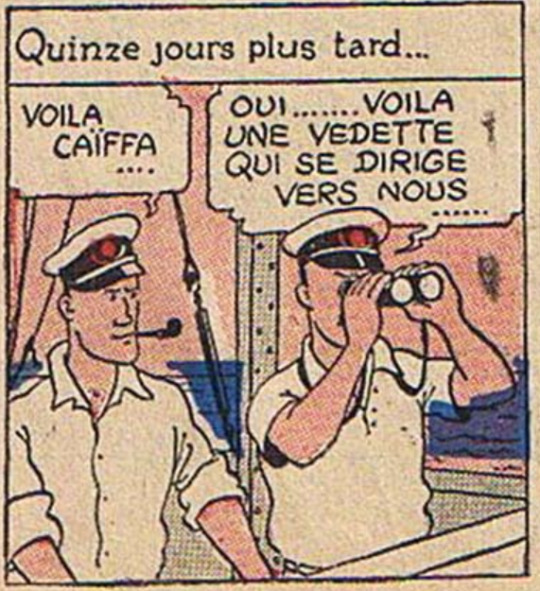
p. 14 (album: p. 7), p. 27 (album: p. 14): The original destination of the Speedol Star is Caïffa (Haifa), a real city in Palestine, instead of the fictional Khemkhâh (Khemikhal in English), Khemed.
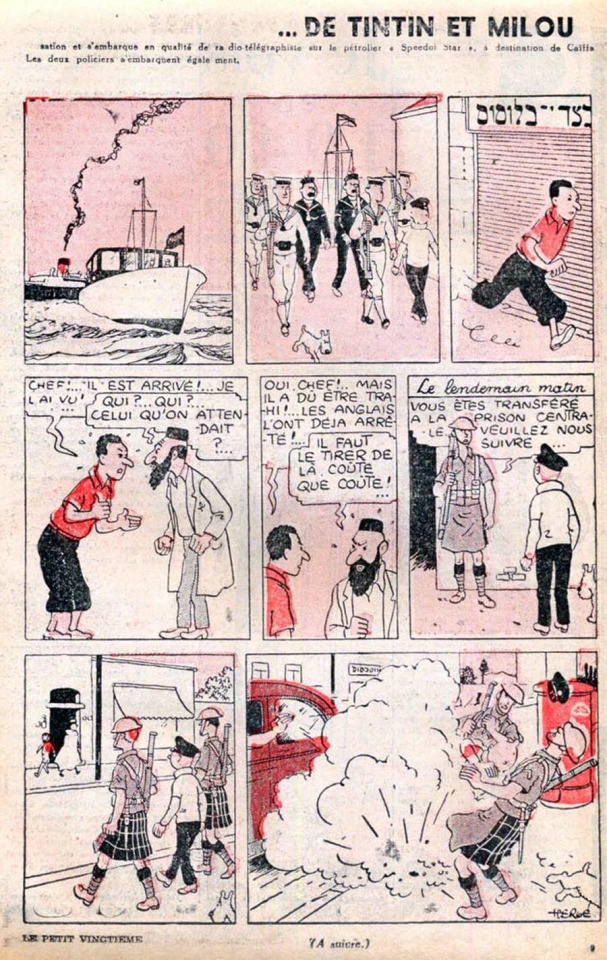

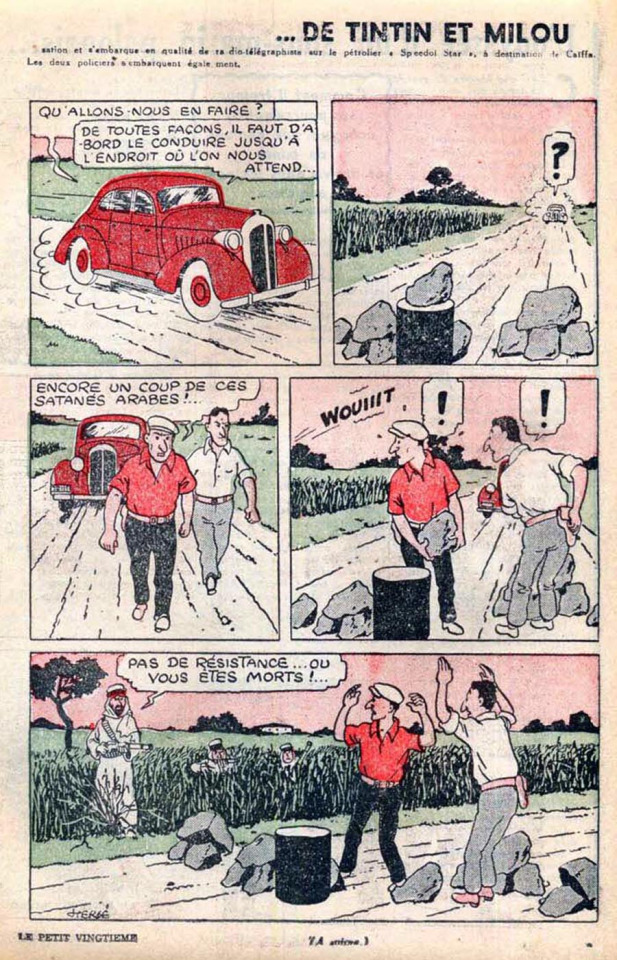

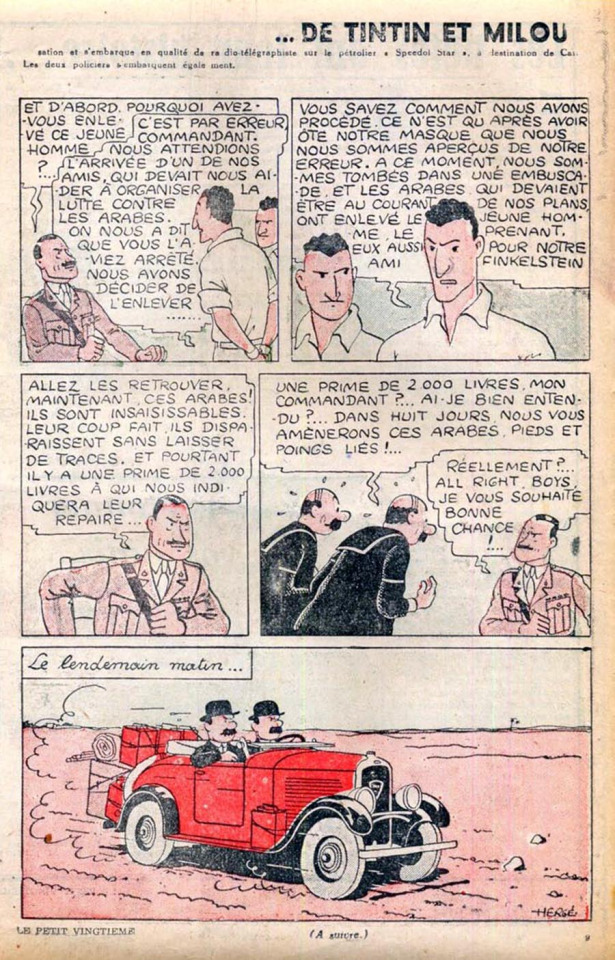
p. 30-34 (p. 15-17): Tintin's kidnapping progresses rather differently than in the 1971 album version. Arrested by the British police as a drug-smuggler, members of the Zionist faction mistake him for one of their agents (the only other man in the world with that haircut) and attempt to seize him back, but quickly realize their mistake. They are stopped by a roadblock and held up by members of the Arab faction, who also mistake Tintin for the same agent and capture only him. The original attackers are then arrested by the British and interrogated. The Thompsons, tempted by the £2000 reward, set out to search for Tintin's new captors.
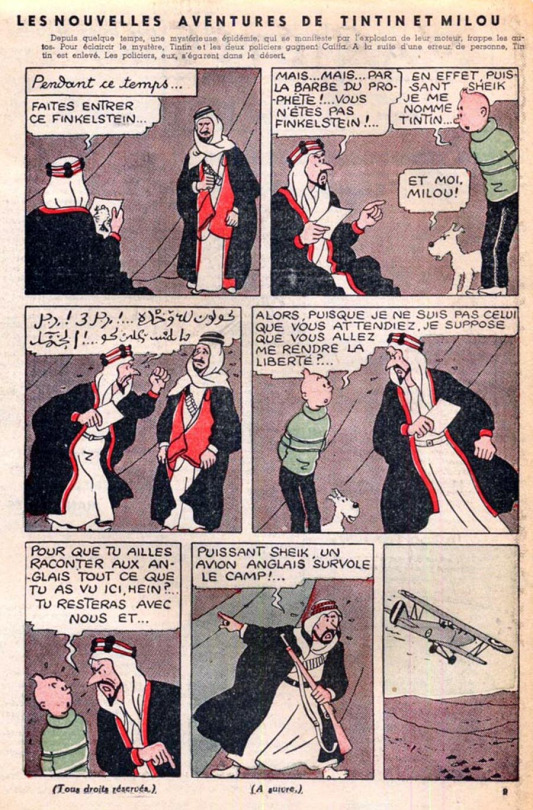
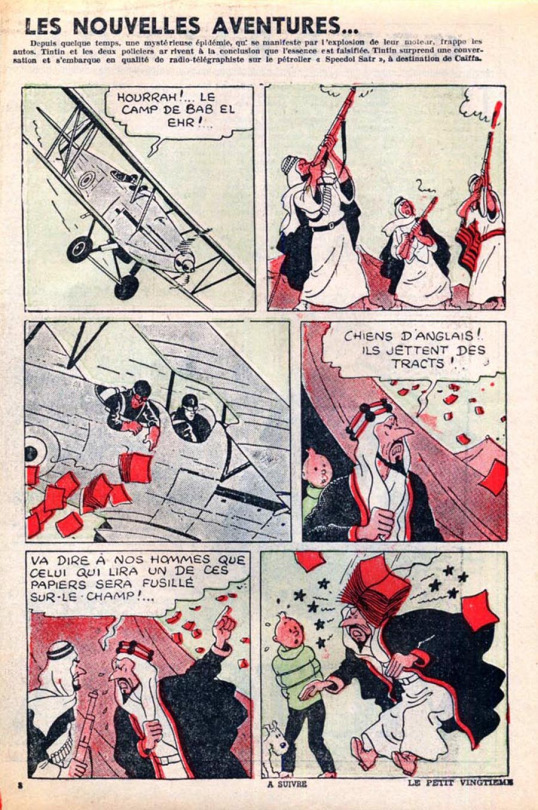
p. 37-38 (p. 17-18): Tintin is taken to Sheik Bab El Ehr, who also realizes he has the wrong man, but refuses to let Tintin go for fear that he'll betray their position to the British. A British biplane buzzes the camp and drops leaflets.
The joke about Bab El Ehr's men not knowing how to read is only in the 1971 album; originally he takes the leaflets seriously, threatening to have any man who reads one shot. On the next page, Tintin surreptitiously takes a leaflet from a stack while the Sheik's back is turned, a detail present in all serial versions but never followed up on in any of them; it's unclear what Hergé was planning to do with it, if anything.

Starting on p. 40 and continuing until the end of publication, the recap of the story in the header mentions that "Tintin and the detectives travel to Palestine." Earlier pages, starting p. 16, repeat that the destination of the Speedol Star is Caïffa.
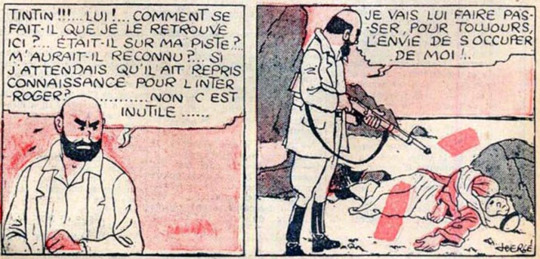
p. 56 (p. 27): Dr. Müller, aided by Arab rebels, blows up a pipeline. Tintin witnesses it, but is caught and apparently about to be killed... and then the story abruptly ends. On May 10, 1940, the Nazis enter Belgium, and Le Vingtième Siècle is shut down by the German occupier along with the rest of the Belgian press. Hergé reappears four months later in the occupier-run Le Soir with a new story, The Crab with the Golden Claws, dropping his politically sensitive subject and German villain.
Second serial version in Coeurs Vaillants, June 9, 1940-Dec. 29, 1940, and La Voix de l'Ouest, June 1, 1945-May 5, 1946 (incomplete)
Coeurs Vaillants, another right-wing Catholic children's magazine, began the French serialization of the Petit Vingtième's Land of Black Gold exactly a month after the last issue of the PV appeared and less than a week before the Nazis entered Paris. Originally based in the capital, the magazine moved its operations to Lyon, in unoccupied Vichy France, and continued to publish the story until the end of the year, cutting it short slightly before the first version does. With that context, the main interest of this version lies mainly in the crude censorship imposed on it.
It was also Coeurs Vaillants that coined the album's eventual title - the story had been serialized in the PV under the generic title of "Les nouvelles aventures de Tintin et Milou," as were The Black Island and The Broken Ear.
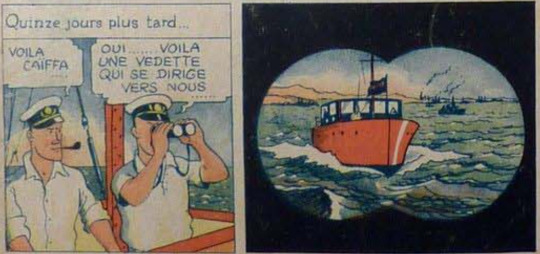
Issue no. 42: The Speedol Star arrives at Haifa once again.
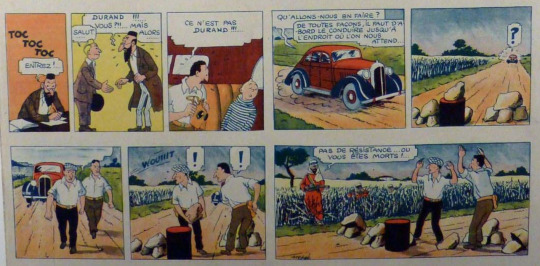
no. 44: The Jewish name "Finkelstein" is changed to the French name "Durand." The remark about "ces satanés Arabes" ("those blasted Arabs") is completely erased and its balloon converted into a cloud(?). All edits are clearly done by the magazine after receiving the plates.
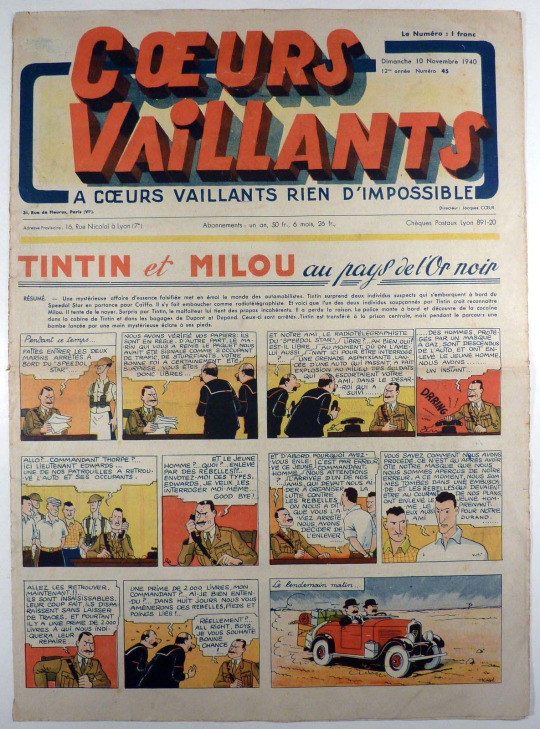
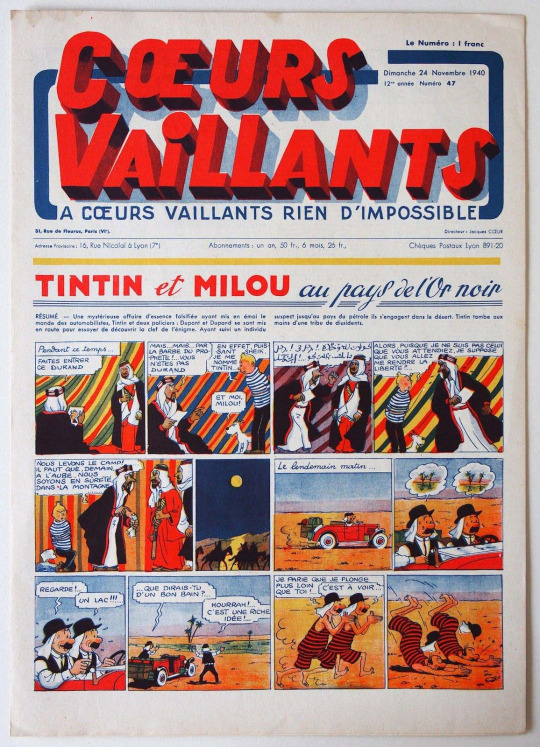
no. 45: Every instance of the word "juif" ("Jew") is erased, leaving blank spaces in the balloons; every instance of the word "arabe" ("Arab") is replaced with "rebelle" ("rebel"). If it's an attempt to obscure the setting of the story, it's a very clumsy one; Hergé's drawings are so clearly stereotyped that any reader of 1940 would surely be able to fill in the missing words themselves.
no. 47: The eleven panels comprising the incident with the British plane are deleted altogether. Tintin is ignored when he asks if he can leave. Tintin again takes a leaflet, but now they seem to have appeared out of nowhere. Most likely the magazine, which loudly and frequently proclaimed its admiration for Pétain during its Vichy residency, was wary of portraying the British Army in any way that could be construed as positive - or even of portraying the British Army at all. However, the police in the beginning are still clearly British, right down to their "Good Bye"s and "All Right"s.
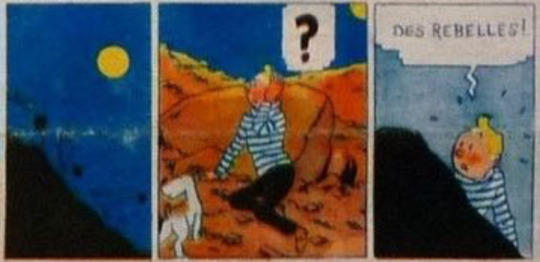
no. 52: Another instance of "arabes" changed to "rebelles." At six pages short of where the Vingtième publication stopped, this is the last page published in Coeurs Vaillants. In 1945, following the Liberation, it began publishing the story again from the beginning, but the magazine was quickly shut down by the government for having existed during the Occupation. The publication of Black Gold was then moved to a similar, smaller paper, La Voix de l'Ouest, but only made it as far as the Thompsons setting off into the desert to look for Tintin. Despite being published after the Liberation, it keeps all of the dialogue edits from Coeurs Vaillants.
Third serial version in the Journal Tintin, Sept. 16, 1948-Feb. 23, 1950, and first album version, 1950
Eight years later, having just finished the extensive serialization of Le Temple du Soleil but not yet ready to begin the research-heavy Moon books, Hergé decides to redraw and complete the story, naming it simply L'or noir (Black Gold). Swiss magazine L'Echo Illustré also runs this version, with no apparent changes, from 1949-1950. Fighting had broken out afresh between Palestinians and Zionist settlers following the UN Partition Plan proposing the creation of the state of Israel at the end of 1947 and was still in full swing when the story restarted. The British had withdrawn in May 1948 (on the same day as the declaration of the state of Israel) but are still present in the story, setting it slightly behind the times.
The 1948 serial was compiled into an album with a few minor changes and new colors in 1950; curiously, the album is actually more specific than the serial in its references to the conflict in Palestine. This is also the version that the 1963 RTF radio adaptation of Black Gold is based on.
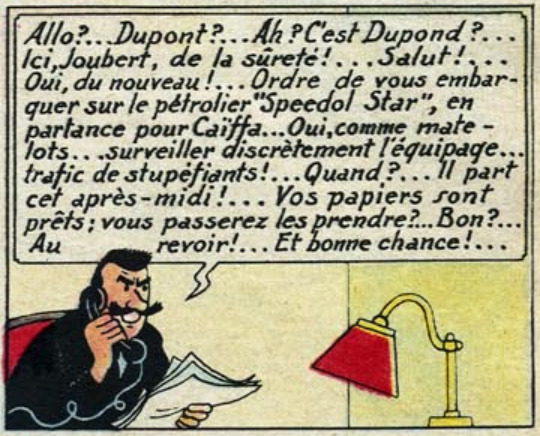
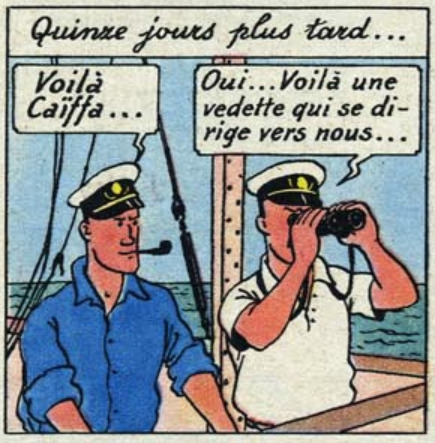
p. 7, p. 14 (1948): The Speedol Star's destination is still Caïffa. Neither the word "Palestine" nor "Israel" is mentioned, either in the strip itself or in the weekly recap in the header, for the whole story.


p. 7, p. 14 (1950): Same destination, but the spelling is finally corrected to "Haïfa" in the 1950 version. The Thompsons are now looking for spies aboard the Speedol Star instead of drug-smugglers. The sailor with binoculars also now specifies that the patrol boat coming to meet them is from "la Navy." Earlier versions had the sailor express surprise at the police coming aboard; in the album he concludes, very logically, that surveillance has been upped because of the tense international situation, though he doesn't mention the internal conflict in the country. The 1971 version keeps that line.
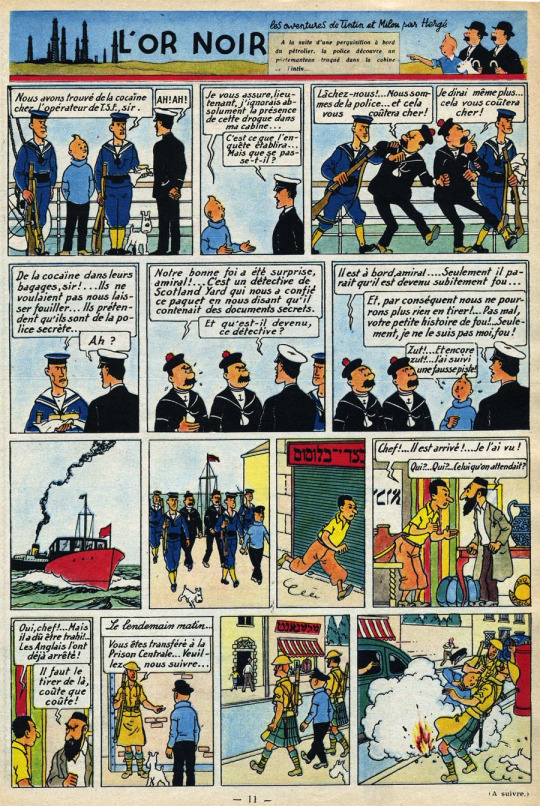
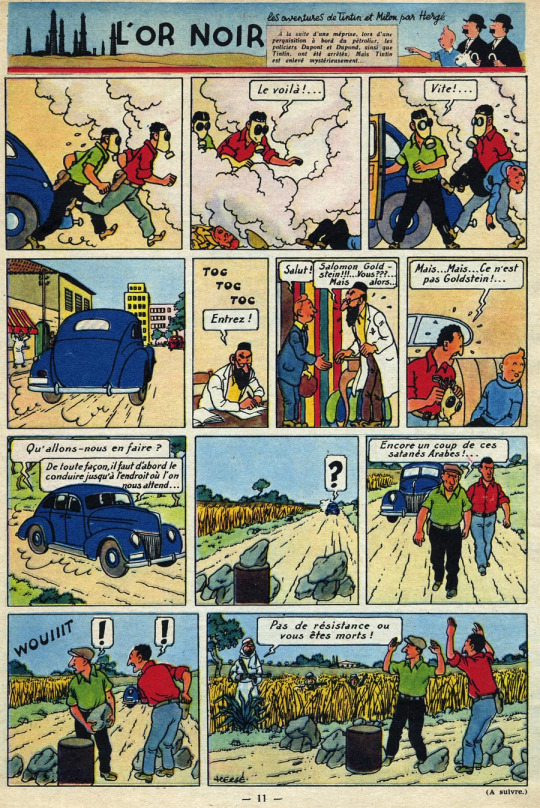
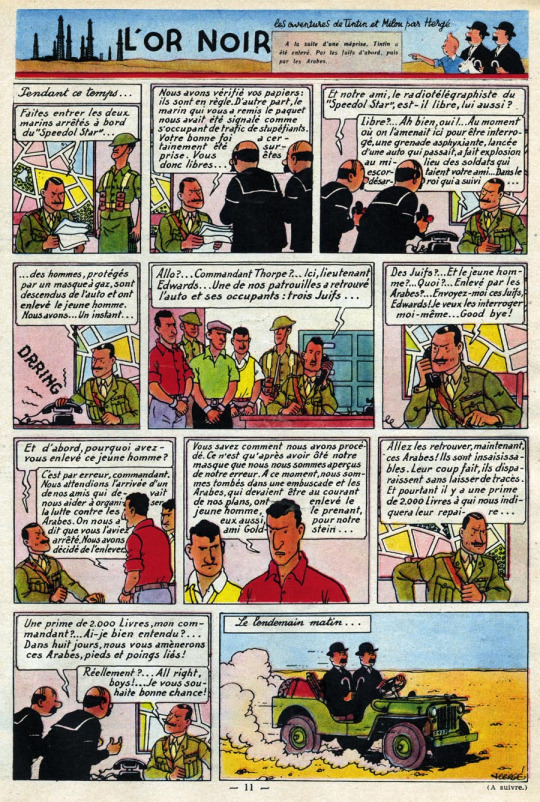
p. 15-17: Tintin's kidnappings play out the same way as in the first version, except that the Zionist agent's name has been changed from "Finkelstein" to "Salomon Goldstein." According to Philippe Goddin, the agent originally got his name from a certain René Finkelstein who worked at Coeurs Vaillants. Goddin doesn't speculate on why it was changed; however, at the end of the 1940s Hergé was having issues with Coeurs Vaillants, as the French edition of the Journal Tintin (launched 1948) was to become the only publisher of Tintin in France, depriving CV of one of its major draws. It's not impossible, though there's no real proof, that Hergé's retraction of Finkelstein was just a petty blow in that struggle.
In the 1950 album, what Tintin and the Thompsons are framed for changes from drug-smuggling to espionage: instead of cocaine, there are unspecified "documents" in their luggage. It's not clear who the original owners of the documents were spying for. The 1971 album splits the difference, with the detectives again caught with cocaine but Tintin with documents.

p. 17: The 1950 album is the first and only version to explicitly name Tintin's first kidnappers as members of the Irgun, a Zionist terrorist group that targeted both the British occupier and Palestinian Arabs between 1931 and 1948 and was later absorbed into the then newly-formed IDF.
It is notable that the depiction of the conflict remains exactly the same as in earlier versions, despite the vast changes in the international situation between 1939 and 1948. At the same time, the broad lines of the conflict in Palestine had changed little since before the war. Is the story still meant to be set in its original pre-war context? None of the announcements preceding its re-release in the Journal mention that it's a recycled story, and many of its readers would have been too young to remember its first run - many, but not all, as a few letter responses show. The cars and planes are updated, but when Bob de Moor was sent out to find references for the 1971 redraw, he specifically chose a tanker from 1939 for the Speedol Star. Also, the nonspecific threats of world war that characterize the first ten pages of the album remain even in the 1971 album, though their immediate link to reality had disappeared by 1948.
The 1948 recontextualization also somewhat obscures the role of Müller, which was very straightforward in the original version: he's a German agent trying to cut off his enemy Britain's access to oil while also undermining its colonial rule of the region - Britain and Germany had already declared war on each other when the first version began publication. It was consistent with the character, as well; a goal of Müller's in The Black Island (1937-1938) was to destabilize the British economy with his counterfeit money.
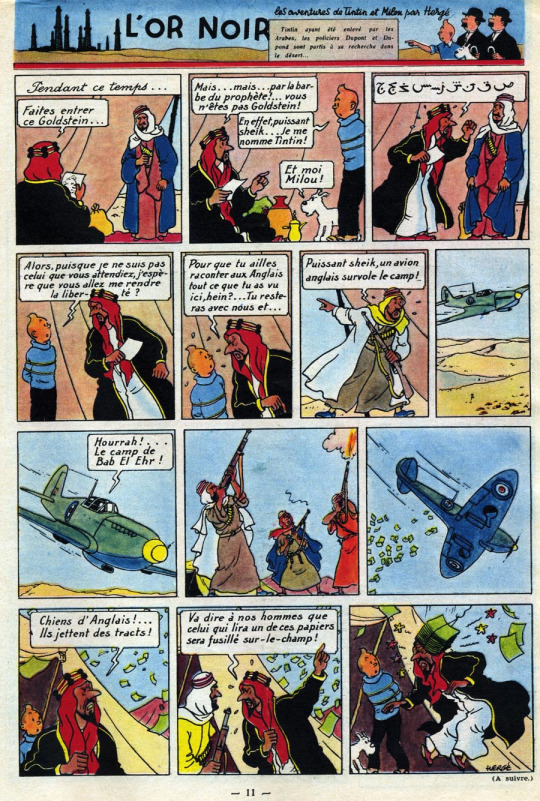
p. 19: The only change is that the British biplane has been upgraded to a British Spitfire. In the 1971 album, it remains recognizably a Spitfire but carries Khemedian livery. Bab El Ehr's enemy is still "les Anglais."
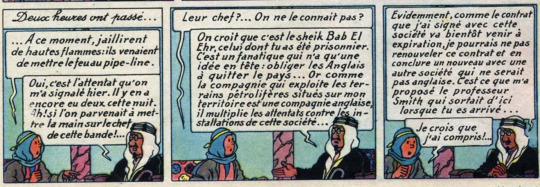

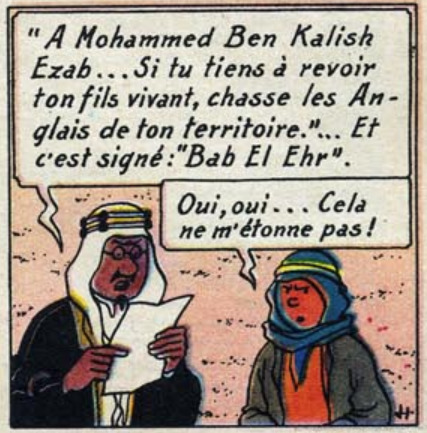
p. 36-38: Having passed the point where the first publication had stopped, the original context begins to disappear. The Zionist presence is entirely gone, making way for the intra-Arab power struggle that is the sole focus of the final album. However, in this case, the struggle between Bab El Ehr and Ben Kalish Ezab is not a proxy war between two competing oil companies but over the continued British presence in this ambiguous nation (see below), with the Emir allowing a British company access to his oil while the Sheik, "a fanatic," only wants to "force the English to leave the country." Predictably, given the publication context, the reader is intended to side with the pro-English forces, though no actual sign of a British - or even non-Arab - presence will appear from here on.
To return to the question of Müller: here, under the assumed English-sounding name of Professor Smith, he is representing non-British oil companies in the region while secretly directing sabotage on oil infrastructure, both by encouraging the destruction of pipelines and by using his "Formula Fourteen" to render oil stores useless. Once again, his motivations are much clearer as a German agent in a pre-war context; the 1948 version has him simply be the tool of that classic early Cold War BD villain, a carefully unspecified "grande puissance étrangère" ("great foreign power").
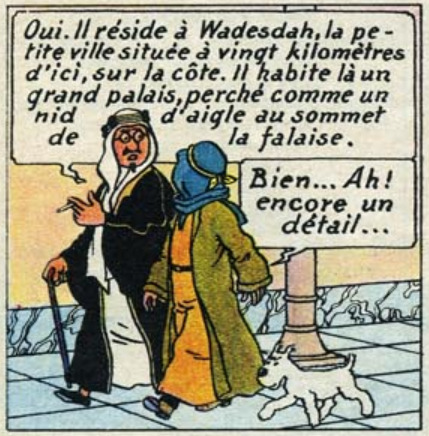

p. 41: The Emir sends Tintin to the fictional city of Wadesdah, "on the coast." Where are we? The Emir's kingdom won't be named until the 1971 album. Palestine fades into a generalized Middle East during the crossing of the desert, the two held together only by Bab El Ehr's struggle against the British in both territories. While the 1971 redraw was the ultimate erasure of the story's original context, it's clear that Hergé had already put it to the side as early as 1948.
As the story transitioned from a specific to a fictional context while attempting to maintain a coherent plot, it was forced to contort and contradict itself; it's not really surprising, then, that Hergé told Numa Sadoul he found the 1971 revised storyline "much simpler, therefore better." Sadoul lightly challenges him on it, however, bringing up Blue Lotus as an example of a technically outdated album that Hergé never considered de-politicizing. It seems to me the difference is that while the real-life political resonance of Blue Lotus is essential to its story all the way through, the only completed version of Black Gold abandons its link to reality around the halfway mark, making the redraw possible and, from Hergé's point of view, even desirable. It also betrays the short-sighted attitude of both Hergé then and Methuen later that partition and the declaration of Israel had simply settled the question of Palestine for good, an attitude that was mistaken then and is mistaken now.
53 notes
·
View notes
Text

All the books I read this year! I don't differentiate between audio, paper, or digital for my list so it varies. book list and my faves below!
Title list and whether they're a Yes No or Maybe book
Nevernight - Jay Kristoff - YES
Book of Night - Holly Black - YES
Iron Widow - Xiran Jay Zhao - YES
Emily Wilde's Encyclopedia of Fairies - Heather Fawcett - YES
Godsgrave - Jay Kristoff - YES
The Fifth Season - N. K. Jemisin -YES
Longshadow - Olivia Atwater -YES
Valiant - Holly Black - YES
Queen Takes Knights - Joely Sue Burkhart - MAYBE
The Princess and the Goblin - George MacDonald - MAYBE
Crown Duel - Sherwood Smith - MAYBE
Court Duel - Sherwood Smith - YES
Vicious - V. E. Schwab - YES
The Obelisk Gate - N. K. Jemisin - YES
Nettle and Bone - T. Kingfisher - YES
The Stone Sky - N. K. Jemisin - YES
The Wolf and the Woodsman - Ava Reid - MAYBE
House of Salt and Sorrows - Erin A. Craig - YES
Darkdawn - Jay Kristoff - YES
Annihilation - Jeff VanderMeer - YES
Gallant - V. E. Schwab - YES
The Boneless Mercies - April Genevieve Tucholke - MAYBE
Six Crimson Cranes - Elizabeth Lim - MAYBE
The Dragon's Promise - Elizabeth Lim - MAYBE
Spin the Dawn - Elizabeth Lim -YES
Frankenstein - Mary Shelley - YES
Emily Wilde's Map of the Otherlands - Heather Fawcett - YES
A Master of Djinn - P. Djeli Clark -YES
All the Stars and Teeth - Adalyn Grace - NO
The Mysterious Affair at Styles - Agatha Christie - MAYBE
Thornhedge - T. Kingfisher - YES
Spinning Silver - Naomi Novik -YES
Bury Your Gays - Chuck Tingle - YES
The Seventh Bride - T. Kingfisher - YES
Ink Blood Sister Scribe - Emma Torzs - YES
Mexican Gothic - Silvia Moreno-Garcia - YES
The Foxglove King - Hannah Whitten - NO
A House with Good Bones - T. Kingfisher - YES
Horrorstor - Grady Hendrix - MAYBE
His Majesty's Dragon - Naomi Novik - YES
A Wizard's Guide to Defensive Baking - T. Kingfisher - YES
These Violent Delights - Chloe Gong - NO
A Gentleman's Guide to Vice and Virtue - Mackenzie Lee- YES
Throne of Jade - Naomi Novik - MAYBE
A Strange and Stubborn Endurance - Foz Meadows - YES
Uprooted - Naomi Novik - YES
The Guided Wolves - Roshani Chokshi - MAYBE
The Warm Hands of Ghosts - Katherine Arden - YES
The Hundred Thousand Kingdoms - N. K. Jemisin - MAYBE
A Magic Steeped in Poison - Judy I. Lin - MAYBE
A Deal with the Elf King - Elise Kova - MAYBE
Black Powder War - Naomi Novik - YES
Empire of Ivory - Naomi Novik - YES
The Familiar - Leigh Bardugo - YES
My five star reads from this year with reviews that are longer than just a single word woohooooo
Emily Wilde's Encyclopedia of Fairies - Heather Fawcett - EXCELLENT COSY FANTASY. Emily is an autistic queen, Shadow is best boy, and Wendell is dramatic and flashy and I love him. Read if you like the Howl and Sophie (book version!!) dynamic or scary fairies more in line with the way they're presented in folklore.
The Fifth Season - N. K. Jemisin - CHANGED MY LIFE I THINK ABOUT THIS BOOK AT LEAST ONCE A WEEK. I literally don't know how to talk about the actual plot without giving things away but holy shit. just read it it's so good. Please investigate any trigger content that might be in this it has a lot!
Longshadow - Olivia Atwater - COSY REGENCY FANTASY ROMANCE!!! Honestly, any of Olivia Atwater's regency fairytales are super cute.
The Obelisk Gate - N. K. Jemisin - continues from the fifth season! also very good!!
Emily Wilde's Map of the Otherlands - Heather Fawcett - continues from EWEoF!
A Master of Djinn - P. Djeli Clark - DO ANY OF YOU LIKE BOOK WITH MULTIPLE LADIES WHO ARE SO SO COOL AND ALSO A STEAMPUNK-Y EGYPTIAN SETTING FULL OF DJINNS AND ANGELS AND MAGIC I am frothing at the mouth for more of this world ngl
Spinning Silver - Naomi Novik - MORE SUPER COOL LADIES but they're in medieval eastern europe, all three povs are super great and I like the understated romance
Mexican Gothic - Silvia Moreno-Garcia - Gothic heroines a la Jane Eyre combined with 1950's mexico. an excellent horror that has a surprisingly wholesome and endearing romance within it.
His Majesty's Dragon - Naomi Novik - NAPOLEONIC WARS BUT THERE ARE DRAGONS. This is the first in a series and because there are a fair amount of them the books themselves can seem a little slow paced but I didn't mind it.
A Wizard's Guide to Defensive Baking - T. Kingfisher - BREAD WIZARD AND HER GINGERBREAD MAN FAMILIAR SAVE THE FUCKING TOWN. really good look at how children navigate an adult world and the unfair expectations placed on them.
Uprooted - Naomi Novik - GIRL CREATURE AND BOY FAILURE I love the way this book explores people who fit outside the usual mode of learning or educational parameters.
The Warm Hands of Ghosts - Katherine Arden - exploration of a brother and sister's experiences in world war i. The prose and character study in this are incredible.
#books#im not tagging all of them lol#this post is mostly so I can doodle some of the characters from my faves and reblog it to my art blog teehee
39 notes
·
View notes
Note
(this is spacekrakens lmao) dude idk anything about like 1950s Japanese cinema, do you have any recommendations? looking for stuff to toss on the watchlist now that I'm a bit burned out on horror (unless you have some horror recs)
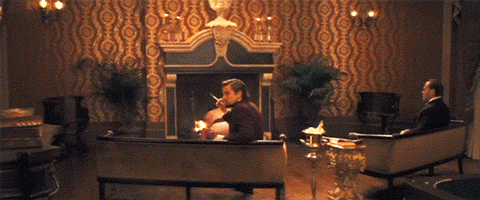
Hey! If you’re curious about Japanese cinema (particularly 1950s), there’s a lot of avenues to explore! Musicals, crime, horror, historical—it all depends on what mood you’re in. (Putting this under a read more because I'm DEFINITELY going to be long posting about this!!!) Hope this is useful to you lol.
(Also noting if anybody wants to add to this list with their own recommendations feel free!!)
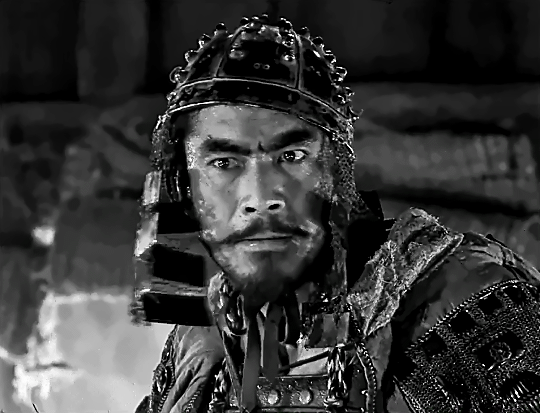
With old school Japanese cinema, I’ll always recommend Akira Kurosawa (obviously). He’s made some of the best Japanese movies (and arguably, the best movies of all time imo) and I feel like his work is a good gateway. It’s readily available on physical media/streaming too.
Specifically ‘50s stuff; Hidden Fortress (1958) is a good adventure flick whose structure was swiped for Star Wars, Throne of Blood (1957) is Japanese Macbeth if you like Shakespeare, and if you don’t mind a longer movie Seven Samurai (1954) includes Toshiro Mifune acting like this;
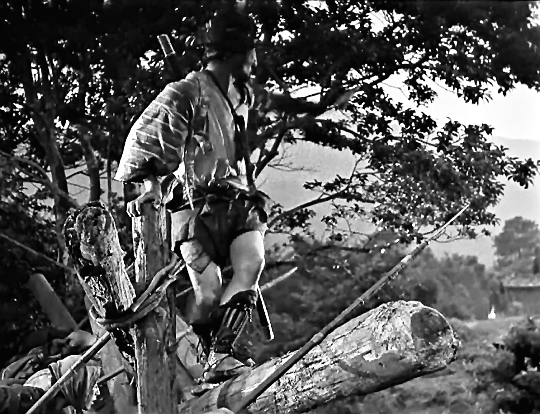
Gotta admit, though—my personal favorites from Kurosawa don’t come from the 1950s; Drunken Angel (1948) and Yojimbo (1961). One has a pathetic gangster as the main lead, the other is just a solid, breezy proto-action film (also has my beloved Unosuke but that's besides the point)
Some personal favorites of mine from the 1950s:
Life of a Horse Trader (1951) is a bittersweet story about a man trying to be a good single father to his son in the backdrop of Hokkaido. He tends not to be great at it. Stars Toshiro Mifune, the most famous face of Japanese cinema and for good reason!
Conflagration/Enjo (1958) is a single Buddhist acolyte’s fall into quiet insanity. Raizo Ichikawa is another amazing actor who I love! Also includes Tatsuya Nakadai who is the GOAT (in my heart).
Godzilla (1954) is AMAZING! If you liked Gozilla Minus One, it took a lot of familiar cues from this movie. It also technically counts as horror, depending on your definition.
Japanese horror from the 1950s:
Ugetsu (1951) (Not one I’ve seen personally, but it’s on Criterion)
The Beast Shall Die (1958) (American Psycho, but in Showa Japan. Tatsuya Nakadai is terrifying in this and absolutely despicable—stylish movie tho!)
Ghost of Yotsuya (1959) (Old-school Japanese ghost story. Honestly, there are so many different versions of this story on film that you can pick which version to watch and go from there—I’m partial to the 1965 version myself, because of the rubber rats and Tatsuya Nakadai playing a crazy person).
The Lady Vampire (1959) is the OG western-style vampire movie from Japan. Plays around with the mythos a lot, but hey our Dracula looks like this;

Misc movies that I think are neat or good gateway movies:
The Samurai Trilogy by Hiroshi Inagaki, which stars Toshiro Mifune as Miyamoto Musashi. Found that people otherwise uninterested in Japanese cinema really enjoyed this!
You Can Succeed, Too (1964) is one of my favorites from the ‘60s, also directed by Eizō Sugawa. A fun satire on the corporate world that's super colorful with catchy songs.
The Sword of Doom (1966) is also another favorite of mine, starring my beloved Tatsuya Nakadai as another bastard man (seriously though Ryunosuke is FASCINATING to me--). Fun gore effects and action scenes!
Kwaidan (1964) is an anthology of Japanese folk tales, labeled a horror film but in that kinda sorta old-school way. Beautifully shot by my favorite Japanese director Masaki Kobayashi (who, if you like this you should seriously check out his other work!)
#thanks for the ask!#akira kurosawa#tatsuya nakadai#toshiro mifune#raizo ichikawa#japan#film#godzilla#hidden fortress#seven samurai#drunken angel#yojimbo#enjo#sword of doom#kwaidan#you can succeed too#samurai trilogy#the lady vampire#ghost of yotsuya#ugetsu#life of a horse trader#throne of blood#ask
96 notes
·
View notes
Text
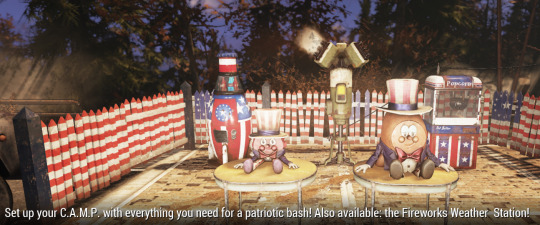
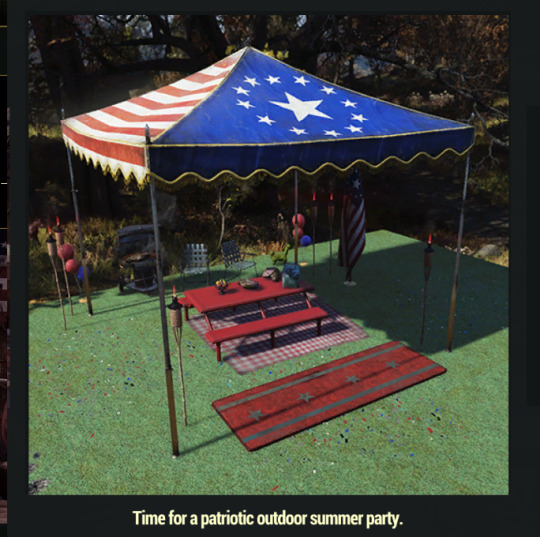
I know the devs making stuff for fo76 are so tone deaf they need an interpreter at this point, but it's so crazy I'm pasting what i said to someone else here:
conflating celebrating actual 4th of July with waving the fictional flag of fallout’s fictional version of America has always been YIKES. Branding stuff in the atomic shop with the 13 star commonwealth flag instead of just painting stuff red white and blue is a choice. 😬
It's a choice to glorify the fictional America that kidnapped protesters and sent them to be experimented on and then murdered, had checkpoints and raids to detain “communist spies” they sent to concentration camps, inflated prices to unsurvivable with the resource wars, invaded Mexico and “annexed” Canada (killing civilians), being corrupted and controlled by an oligarchy deep state fueled by fascism and eugenics…oh and then it got blown up.
It’s crazy propaganda works so well people are defending and celebrating patriotism for even a fictional version of America that is literally ment to be the worst version of itself. Fallout’s original cautionary tale about jingoism with satirical 1950s amaricana has become idealized. Again, I don’t care about the fictional fallout version of America, and I really don’t care about the 13 star flag. No one should. shoot giant crabs with a minigun instead.
18 notes
·
View notes
Text

The Great Escape is a 1963 American epic war adventure film starring Steve McQueen, James Garner and Richard Attenborough and featuring James Donald, Charles Bronson, Donald Pleasence, James Coburn, Hannes Messemer, David McCallum, Gordon Jackson, John Leyton and Angus Lennie. It was filmed in Panavision, and its musical score was composed by Elmer Bernstein. Adapted from Paul Brickhill's 1950 non-fiction book of the same name, the film depicts a heavily fictionalized version of the mass escape by British Commonwealth prisoners of war from German POW camp Stalag Luft III in World War II. The film made numerous compromises for its commercial appeal, including its portrayal of American involvement in the escape.
12 notes
·
View notes
Text
Welcome to the War Zone
This fic has been sitting in the dusty corners of my brain (and my notes app) for a long time, and I'm finally unleashing it on the world—God help us all.
I've always loved both the heart and absurdity of MASH* and the chaotic brilliance of the Avengers, so naturally, my brain said: "Why not throw them into a surgical unit together during wartime and see what explodes?" The answer, apparently, is everything.
I also may have let my sarcastic self completely off the leash for this one. No regrets. (Okay, maybe one—but it's probably John Walker.)
This is the first piece in what I hope will be a series full of blood, banter, questionable medical choices, and found-family feels. I genuinely hope you enjoy the chaos as much as I do—and if you hear choppers in the distance, don't panic. Probably.
Thanks for reading and joining the 4077th! 🫡

•Characters: Steve Rogers, Bucky Barnes, Sam Wilson, Natasha Romanov, Clint Barton, Bruce Banner, John Walker, Sharon Carter, Yelena Belova, Maria Hill, Scott Lang, Wade Wilson, Tony Stark, Phil Coulson. •Rating: Mature •Tags: Humor, Angst, Found Family, Ensemble Cast, War-Time, Medical Drama, Bittersweet, Alternate Universe – MAS*H Fusion, Crossover, 1950s Setting, AU: Mobile Army Surgical Hospital, War Zone Setting, Superheroes Without Superpowers, Surgical Snark, Everyone Is Tired and Sarcastic, Steve Rogers Has Had Enough, Bucky Barnes Deserves a Nap, Wade Wilson Is the PA System, Clint Barton Is in a Dress, Coffee as a Coping Mechanism, War is Hell, But So Is the Mess Tent, Graphic Depictions of Injury, Medical Procedures, PTSD Themes, Off-Screen Character Death.
Summary:
War is hell—but the real chaos lives in the makeshift tents of the 4077th.
In this opening one-shot, meet the doctors, nurses, and walking stress responses holding the line between life and death (and barely holding it together themselves). Some are heroes, some are hazards, and some are just here for the coffee—no matter how questionable it is.
New faces arrive, sarcasm flies, and the surgical staff of The 4077th Initiative assembles… in the most uncoordinated way possible.

🎵 Cue a slightly jazzier, warbled version of the Avengers theme mashed with the MASH theme* 🎵
STARRING:
Steve Rogers as Captain Hawkeye Pierce – Surgeon. Still armed with an unmatched moral compass, a biting wit, and way too much coffee. Don't let the Boy Scout smile fool you—he's got opinions, and he's not afraid to voice them.
Bucky Barnes as Captain "Trapper John" Mclntyre– Surgeon. The only thing sharper than his scalpel is his tongue. Equal parts charm, trouble, and whiskey breath. Steve's partner in crime (and in OR).
Sam Wilson as Spearchucker – Surgeon. Sharp, steady hands and a sharper sense of humor. Throws a mean football and doesn't miss a beat in the OR.
John Walker as Major Frank Burns – Surgeon. By-the-book, self-righteous, and exactly the guy you don't want in charge of a chest wound. Somehow, it always manages to miss the point and the vein.
Sharon Carter as Major Margaret Houlihan– Head Nurse. Cool under pressure and impossible to intimidate. Keeps the nurses in line, the surgeons in check, and the whole damn camp running—whether they admit it or not.
Natasha Romanov as Nurse Romanov. Doesn't talk much, but when she does, you should listen. Has a sixth sense for danger—and morphine dosage.
Yelena Belova as Nurse Belova. Blunt, bold, and far too amused by blood and chaos. She thinks the war is dumb, the uniforms are uglier, and the food's a war crime.
Maria Hill as Nurse Hill. Reliable, efficient, and possibly running her own covert operation on the side. You want her in your corner.
Scott Lang as the Anesthesiologist. He'll knock you out gently and wake you up with a joke. Sometimes forgets where he left the ether. Or the patient.
Clint Barton as Corporal Klinger. Still waiting for someone to notice he's not wearing regulation anything. Today's dress: army green...with sequins.
Bruce Banner as Father John Mulcahy – Chaplain. Mild-mannered, thoughtful, and trying very hard not to lose his temper during confession. Please don't ask him about the wine shortage.
Wade Wilson as the PA Announcer/Staff Sergeant Voice of the camp, master of chaos. If you hear him on the loudspeaker, duck—or laugh. Maybe both.
Tony Stark as Radar. He knew the shelling was coming ten minutes ago. Built three radios, two coffee pots, and a still out of leftover shrapnel and a spoon. Do not underestimate the kid with the clipboard.
Phil Coulson as Colonel Potter – Commanding Officer & Surgeon. The calm in the storm. Keeps the camp standing, the surgeons in line, and the war out of their heads—at least until the next batch of wounded arrives.

4077th: Assembly Required
Somewhere near the 38th parallel, deep in the heart of Korea and even deeper in the middle of chaos.
"Attention all personnel: incoming wounded. If you can stand, walk. If you can't walk, crawl. If you're John Walker, stay in bed—we're doing fine without you."
The sound of incoming choppers echoed across the hills, their blades slicing the early morning fog like angry wasps. A gust of wind kicked up dust as the first Huey dipped low over the treeline, its dull olive belly flashing between clouds and smoke.
At the edge of the camp, the helipad came alive—orderlies rushing out like ants from a kicked hill, stretchers clattering, boots pounding the hard-packed dirt. The air buzzed with urgency, that sharp, tense kind of silence before everything breaks loose.
Captain Steve Rogers stood just outside the surgical tent, arms crossed, his stethoscope looped around his neck like a noose. His uniform shirt was unbuttoned at the throat, sleeves rolled up, and his expression was the kind that said this wasn't the first pre-dawn drop-off—and wouldn't be the last.
Beside him, Bucky Barnes nursed a dented tin mug of lukewarm coffee like it was the last holy relic on Earth. His hair was tied back with a rubber band that had seen better days, and a cigarette hung from the corner of his mouth, untouched but glowing faintly in the breeze.
"Another lovely morning in paradise," Bucky muttered, squinting toward the chopper as it hovered in place, kicking up clouds of dust and grit. "Think this one's got actual patients or just more paperwork in bandages?"
Steve exhaled through his nose, lips twitching. "Let's hope for patients. I'm running out of ways to threaten John Walker without getting court-martialed."
As if summoned by sheer spite, Major John Walker came marching around the side of the mess tent, clipboard in hand, uniform crisp and clean as if the war couldn't touch him. His boots were freshly shined, and not a single blonde hair was out of place under his cap.
"Maybe if you two spent less time fraternizing and more time preparing for triage, we wouldn't be constantly scrambling when the choppers come in," he barked.
"Good morning, John," Bucky said with a slow, oily grin.
Walker's spine stiffened like he'd been braced by a steel rod. "That's Major Walker, Barnes."
Bucky shrugged. "And yet, I still feel like I outrank you in basic personality."
"Enough," snapped a voice sharp as a scalpel.
Sharon Carter appeared like a storm front, striding toward them in her fatigues with a clipboard tucked under one arm and her blonde hair pulled into a no-nonsense bun. Her gaze was cool, cutting, and already halfway through her mental list of things that needed doing.
"Cut the crap, ladies. We've got incoming casualties and exactly ten minutes to act like professionals. I want hands clean, masks on, and no snide remarks once we're in the tent."
"Yes, Nurse Carter," Steve said, tone mild but eyes crinkling at the edges.
"That's Major Nurse Carter to you, Captain Rogers," she shot back without missing a beat.
Somewhere to the left, Clint Barton emerged from the supply tent like a fashion show in a warzone. He wore a red sundress that fluttered dramatically in the rotor wash, paired with combat boots and a wide-brimmed straw hat covered in plastic daisies. He carried a tray of surgical tools like he was presenting hors d'oeuvres.
Steve gave a low whistle. "Looking good, Barton!"
Bucky raised his mug in salute. "That's a nice color on you," he called. "Brings out the danger in your eyes."
Clint blew them both a kiss and curtsied with the tray of surgical tools. "Flattery will get you everywhere, boys."
"Barton, put on some damn pants!" Sharon barked, not even looking up from her clipboard.
"Ma'am, these are my pants," he replied, all innocence as he sashayed off toward the OR.
From the loudspeaker mounted on the comm tent, Wade Wilson's voice crackled to life with all the enthusiasm of a game show host on Red Bull.
"Attention, 4077th! Today's forecast includes bullets, blood, and emotional trauma, with a seventy percent chance of sarcastic banter and mild existential dread. Don't forget to sign out your morphine rations, and remember—if you're gonna lose a limb, do it before lunch. Mess hall's serving spaghetti again, and I will be cutting the line."
The chopper finally touched down, skids grinding into the dirt, and the medics surged forward. The roar of the engine faded just enough to let in the groans and shouts of the wounded being lifted out.
Steve turned toward the tent, already rolling his shoulders, eyes sharpening.
"Showtime," he said.
Bucky flicked his cigarette into the dirt, drained the last of his coffee, and followed him in. "God help 'em. They're stuck with the best we've got."

Inside the operating room—and "room" was putting it lightly. The building had once been a house, abandoned long before the Army claimed it, patched together with salvaged wood and Army-issued canvas like a surgical Frankenstein. The windows were boarded over, the floor uneven, and the single overhead fan spun with a wheeze that sounded more exhausted than helpful.
The air inside was suffocating—thick with heat, antiseptic, and the sharp, metallic tang of blood. Every breath tasted like copper and effort. The makeshift walls rattled with the wind, shadows dancing across cracked paint and peeling wallpaper, but inside, time only moved in heartbeats and hemorrhages.
"Pressure's dropping!" Sam Wilson shouted from the far table, voice muffled behind his surgical mask. Sweat dripped from his brow, sliding down the fogged lenses of his goggles. He leaned into the open chest in front of him, fingers clamping off a spurting artery like his life depended on it. "He's lost a lot—can someone get suction over here before I drown in this kid?"
"Coming!" Maria Hill answered, already threading her way through the tight space between tables. She moved fast and steady, sidestepping stray boots and a rolling cart like she was built for this chaos.
Scott Lang stood at the head of Sam's table, eyes flicking between monitors and vitals, one hand adjusting the oxygen flow, the other already reaching for meds. "BP's in the basement, but he's hanging on," he reported. "Let's not get fancy, folks. No detours. No hero moments."
"Fancy went out with my last clean pair of socks," Bucky muttered from the next table over, elbow-deep in a chest cavity. His sleeves were pushed up, forearms slick with sweat and blood, a scalpel glinting briefly in the harsh tent lighting. He moved with practiced efficiency—clamp, suture, clamp again. No hesitation. Just speed and muscle memory.
Across from him, Steve mirrored his pace, all calm intensity and focus. His gloved hands moved without pause, always exactly where Bucky needed them—passing clamps, holding tissue, tying off what Bucky couldn't reach. They barely had to speak; twenty years of trust did the talking for them.
"Three more minutes and this guy's lung collapses," Steve said flatly.
"Better him than Walker," Bucky grumbled, not looking up.
"I heard that!" John's voice snapped from the next table, where he was handling a relatively tame shrapnel removal like it was brain surgery. His back was too straight, his gloves too clean, and his face locked in a tight scowl that screamed overcompensation.
"Oh no," Yelena Belova said without inflection from beside him. "Please don't report us to the Army of Fun."
Sharon swept past, clipboard under one arm, her hair tucked beneath a cap that was somehow still regulation neat despite the heat. "Focus, people," she barked, tone sharp enough to cut through the static of tension. "We've got three more choppers circling and no more cots. You want a break? Earn it."
"Wasn't planning on knitting a scarf, Carter," Steve replied, handing off a hemostat without missing a beat.
Colonel Phil Coulson piped up from the back of the operating room, face unreadable beneath his mask, though his eyes told the story—tired, focused, and calm in the storm. He wore his rank like armor, but his sleeves were rolled just like everyone else's. His gloved hands were already bloody, working a complicated abdominal injury with the same quiet authority he brought to everything.
"Less talking, more sewing," Coulson said, voice low but firm as he tied off a bleeder with surgical precision. "We don't need medals. We need survivors."
Across the room, Clint—sashayed past in a pair of scrubs awkwardly tugged over his floral sundress. The hem peeked out below the gown like a secret he had no intention of keeping.—balanced a tray of freshly sterilized instruments with a flourish. He struck a little spin on the way past the operating tables, humming to himself.
"Don't drop those," Bruce Banner warned mildly as he entered with arms full of fresh gauze packs, glasses sliding down his nose behind his mask.
"Or do," he added under his breath. "I'm sure Wade has a tetanus joke ready."
As if summoned by name, Wade Wilson's voice burst through the overhead loudspeaker, cheerful and chaotic as ever.
"This is your friendly neighborhood PA reminding you all to stay hydrated, take breaks where you can, and please don't stitch your gloves to the patient again. Barnes, I'm looking at you."
"I did that once," Bucky muttered.
"Twice," Steve corrected, a grin tugging at the corner of his mouth beneath the mask.
"Semantics."
A beat passed—just a few seconds—but it stretched thin, suspended on the rhythm of suction machines, the metallic clink of tools, the low moan of a patient trying to come around. The buzz of life and death was constant here, pulsing through the tent like a second heartbeat.
"Clamp," Steve said, breaking the silence.
Bucky passed it off without looking. "You're good."
"Bleeding's slowing," Steve confirmed, exhaling slowly. "We've got a shot."
Bucky finally leaned back, flexing his fingers. His scrubs were soaked through, his boots splashed with something he didn't want to identify, and there was still another patient wheeled in on standby.
He rolled his shoulder, looked toward the next gurney, and said, "Alright. Who's dying next?"
The doors of the operating room burst open like a rifle crack, canvas flaps snapping against the sides of the tent. Two corpsmen stumbled in, boots skidding on the blood-slicked floor, a stretcher straining between them. The soldier on it was barely conscious—young, pale, uniform soaked from waist to knee in deep red. One arm dangled over the edge, fingers twitching, useless.
"Incoming!" one of the corpsmen shouted. "He's bad—took shrapnel through the flank. Might've hit the gut!"
From across the room, Steve Rogers glanced up from his station, sweat glistening at his temple beneath the harsh overhead light. He didn't stop what he was doing—his hands were still steady inside a patient's chest—but his eyes found Bucky's across the table.
"You just had to open your mouth," Steve muttered, shaking his head.
Bucky gave a half-shrug, voice dry despite the tension ratcheting up around them. "What? I didn't invite him."
"Where the hell is Carter?" John Walker barked from across the tent, yanking off his bloody gloves with a loud snap. "You can't just bring someone in—we have triage for a reason!"
"No time," the taller corpsman panted. "He started crashing in the Jeep. Stark flagged us halfway here."
Tony Stark stumbled in behind them, flushed and out of breath, jacket half-buttoned and streaked with dirt. "You want protocol or you want him alive?" he snapped. "Because I picked alive."
"Stow it!" Phil Coulson growled from the center table, his hands buried in someone else's abdomen. "Barnes, get over there!"
Walker opened his mouth again, but Bucky was already in motion.
"Nat—gloves!"
Natasha was ready, sleeves rolled, fresh gloves snapped tight in her hands. She slapped them on him in quick, practiced movements as Bucky intercepted the stretcher.
"Clear that cot!" he shouted, and someone swept aside a tray and a set of bloodied tools just in time.
He and the corpsmen lowered the soldier onto the table. Soldier—barely more than a boy, his face a sheet of ash, lips blue at the edges. His eyes flicked up, struggling to focus.
"Scott, I need vitals!" Bucky called.
Scott Lang slid in at the head of the cot, already adjusting oxygen flow and checking the boy's pulse. "BP's in the gutter," he said. "Crashing fast."
Bucky crouched low, already peeling the soaked bandage away from the kids side.
"Name?" he asked.
The kid's lips moved, breath barely a whisper. "D-Donny."
"You're alright, Donny," Bucky said, trying to keep his voice steady. "We've got you. You just stay with me."
As he lifted the bandage, a gush of blood spilled out, thick and fast, soaking the field blanket beneath him.
"Shit." Bucky slammed both hands over the wound. "Pressure! Now!"
Donny groaned, body tensing weakly under the weight of Bucky's palms.
Scott didn't look up. "Systolic's tanking. He's circling the drain."
"Cold..." the kid mumbled. "M'mouth's dry..."
"You're okay, kid," Bucky told him. "Just a scratch. We'll have you patched up and chasing nurses in no time."
Donny's eyes rolled, his voice going thick. "Feels...far..."
"Hey." Bucky leaned in close. "You don't get to check out yet. You hear me?"
The boy didn't answer. His words slurred, lips moving without sound.
"Get him under!" Bucky barked. "Now!"
"I'm trying!" Scott said, frantic. "Give me ten seconds!"
"Give me five!"
Natasha swooped in, slammed the anesthesia mask over Donny's face, and cracked the valve. "It's in," she said.
Donny's body went limp.
"Clamp," Bucky said, already reaching without looking.
Natasha slapped it into his palm.
"Another," he said, wrist-deep in torn flesh and muscle.
Steve was already there beside him, silent and steady, holding retractors and sponges like he'd been doing it for years. He passed what Bucky needed before Bucky asked.
"Bleeder's deep," Bucky muttered. "Can't get to it without suction."
"We're out," someone said.
Hill appeared with a manual hand-pump. "Closest you'll get. Make it work."
Bucky took it without a word and kept going. His arms were red to the elbows, boots slick with blood, but his focus didn't waver. He worked fast—no wasted movement, no hesitation.
The tent buzzed around them—tools clinking, low voices barking orders, the flap snapping in the wind. But for Bucky, the only thing that existed was the kid on the table.
"Come on, Donny," he muttered. "Stay with me."

Scrub Room 10.5 later
The scrub room stank of antiseptic, sweat, and whatever passed for soap in a war zone. The harsh lights overhead buzzed faintly, flickering like they were just as tired as the men beneath them. At the row of metal sinks, Steve and Bucky stood shoulder to shoulder, sleeves rolled high and damp, scrubbing away hours of blood and grime in silence.
Water ran in rust-colored streams down the drain, streaked with iodine and exhaustion. Their movements were methodical, almost mechanical—each rinse, each scrub, a quiet ritual after the chaos of surgery. Neither had spoken since they stepped out of the OR. There wasn't much left to say, not after ten and a half hours of trying to outpace death with steady hands and stitched-up miracles.
Steve finally broke the silence, voice low and hoarse. "That kid... the shrapnel was less than an inch from his spine."
Bucky nodded without looking up, his brow still furrowed. "And that other poor bastard? I don't know how he made it through triage."
"Stubborn," Steve murmured, drying his hands on a stiff, overused towel. "Or just lucky."
Footsteps padded softly behind them, slow and deliberate. Bruce Banner—Father Banner to most—emerged from the operating room still in his gown, gloves bunched in one hand, his cross necklace askew over his scrubs. His face was lined with fatigue, but his eyes were steady, calm in a way only a man who carried both scalpel and scripture could manage.
"You two did wonderful work in there," Bruce said as he stepped up to the third sink, already reaching for the near-translucent bar of soap.
Steve offered a faint smile, the corners of his mouth twitching like he was too tired for anything more. "You say that every time."
Bruce just shrugged. "Because it's true every time. You pulled two miracles out of the mud tonight. If I didn't already believe in a higher power, I'd have started about three hours ago."
Bucky snorted, scrubbing harder at a stain on his wrist. "One of us is blessed. The other's just too damn stubborn to let anyone bleed out on his table."
"I'm standing right here," Steve muttered, glancing sideways.
Bruce gave a slow grin. "God works in mysterious ways. Sometimes through faith, sometimes through grumpy surgeons with authority issues."
Steve gave him a tired side-eye. "Are you talking about me or him?"
"Yes," Bruce replied without missing a beat. Then, more gently, "Also, maybe next time someone sneezes mid-suture, don't say 'whoops' like that. I nearly passed out."
Bucky smirked. "That's Steve's version of tension relief. Keeps morale up."
"Or blood pressure," Steve added, deadpan.
The doors behind them swung open with a hiss, warm air spilling in. John Walker stepped inside, posture straight and jaw tight, not a hair out of place. His scrubs were spotless—of course. Sharon trailed just behind, peeling off her gloves with practiced flicks of her fingers.
"Well, if it isn't the golden boys," John said, arms crossed as he stalked toward the sinks. "Take long enough in there, Rogers? We figured you were composing a love sonnet over the patient."
Steve didn't even blink. He reached for a towel and started drying his hands with steady, unbothered motions.
Bucky, however, grinned and turned slightly. "You jealous, Walker? We could write you one. Starts with, 'There once was a doc with a stick up his—'"
"Barnes," Sharon interrupted sharply, though the exhaustion in her voice dulled the edge. And if there was a ghost of a smile tugging at the corner of her mouth—well, she didn't say otherwise.
John's ears flushed a deep red. "Real mature, Barnes."
"Hey, you started it," Bucky said with a lazy shrug, rinsing one last bit of soap from his fingers. "I just finished it. Like your last suture line."
Bruce coughed—either from amusement or trying not to laugh outright—and turned his back politely. Sharon gave up trying to hide her smirk and pushed back through the tent flap, disappearing into the night.
John stood there, flustered and tight-lipped, trying to recover the high ground.
Steve leaned closer to Bucky as they walked past him toward the tent door, voice low and amused. "You're going to give that man an aneurysm."
Bucky just shrugged again. "One less chart to sign off on."

The scrappy wooden door of the post-op building creaked shut behind them with a tired groan, the metal latch clicking into place as Steve and Bucky stepped out into the night.
The air hit them like a mercy—cool and dry, laced with dust, diesel, and something faintly metallic. Better than the thick, humid stink of antiseptic, blood, and sweat inside. Out here, the chaos had quieted into the kind of stillness only found between triage waves—tense, but bearable.
The compound stretched before them in crooked rows of canvas and plywood, lit in uneven patches by floodlights and flickering lanterns. A generator coughed somewhere near the mess hall, its steady rattle underscored by the distant bark of laughter and the faint clang of tools from the motor pool.
Steve yawned so wide it cracked his jaw, then rubbed a hand over his gritty eyes. "God," he muttered, "I need a week's sleep and someone to realign my spine."
Bucky fell into step beside him, sleeves rolled up, hands shoved deep in the pockets of his wrinkled scrubs. "What's for dinner?" he asked, nodding toward the mess tent across the compound. Its door hung crooked on its hinges, light bleeding out through a crack like it was trying to escape.
Steve snorted. "Probably the same thing we had for dinner last week."
Bucky arched a brow. "Mystery meat and false hope?"
"With a generous helping of mashed cardboard," Steve added, deadpan. "Seasoned to perfection with powdered guilt."
Bucky smirked. "Culinary warfare. The Geneva Conventions should have a clause."
Steve stretched his neck until it popped. "I swear, if they serve those canned peaches again..."
"You'll what?" Bucky said. "Write a strongly worded letter to the chef?"
"No," Steve replied. "I'll do one better. I'll re-enlist in the Navy just for the menu."
Bucky laughed under his breath. "Even the Navy wouldn't try to pass off green-gray meat as edible."
They turned toward the next building, their boots crunching dry earth, shoulders brushing as they walked. It was the quiet kind of exhaustion, where even the banter came softer—habitual, comforting.
The sun sagged low behind the hills, casting long, bruised shadows across the 4077th. Golden light filtered through the canvas flaps like smoke, softening the harsh edges of the camp. Generators thudded steadily in the background, their hum blending with the occasional clang of mess trays and the distant chop of helicopter blades still circling overhead like vultures.
The mess tent smelled like too many meals reheated in the same dented pots—burned coffee, overcooked meat, and something vaguely sour that clung to the air like a bad memory. A single fan in the corner rattled with effort, lazily moving the heat from one end of the room to the other like it was trying to spread the misery evenly.
Inside, the flickering lights buzzed overhead, more a nuisance than a comfort. Folding chairs groaned under the weight of worn-out bodies—blood-stained scrubs, hunched shoulders, sore feet, and faces that hovered somewhere between numb and sarcastic. No one looked entirely human in that moment. Just exhausted.
Steve sat in the far corner, sleeves rolled up, a chipped enamel mug cradled in both hands like it might hold something sacred. Whatever had once been coffee now tasted like dirt filtered through regret, but he drank it anyway, eyes fixed on nothing in particular—just the space ahead of him where silence could settle.
Bucky dropped into the seat across from him with all the grace of a falling sandbag. His tray clattered down—bread, a scoop of grayish mashed potatoes, and a sad pile of peas that looked like they'd seen combat.
"I think those peas just blinked at me," he said, poking one with his fork like it might bite back.
"You're lucky," Steve murmured without looking up. Mine surrendered ten minutes ago. Waved a little white flag and everything."
At the next table, Sam Wilson had his feet kicked up on an overturned crate, a half-eaten tray of food sitting cold in front of him. He nursed a bottle of orange soda like it was the last cold drink in Korea, eyes closed, head tipped back against a tent pole. His scrubs were wrinkled and stained, gloves still stuffed in his pocket like he hadn't decided if he was off the clock or just taking a breath.
Tony Stark breezed in and dropped into the seat next to Bucky with a satisfied grunt. His tray was stacked—double helpings of everything: mystery meat, jello, mashed potatoes, and bread. He picked up his fork like a man ready for battle.
Steve arched an eyebrow. "You feeding a second stomach now, Stark?"
Bucky didn't even glance over. "We're gonna have to pump your stomach later."
Tony, already halfway into his potatoes, mumbled through a mouthful, "Worth it."
"Seriously," Steve said, "if you keel over from meatloaf overdose, I'm not resuscitating you."
"You never do," Tony muttered, shoveling in another bite.
Just then, Clint Barton swept into the tent like he'd been born for the spotlight. He was humming a Broadway tune—loudly and off-key—and wearing a floral sundress beneath his half-buttoned surgical gown, which trailed behind him like a cape. He spun down the aisle with a dramatic twirl, skirt flaring as he dropped his tray beside Yelena with flair.
"Back in my natural habitat," he announced. "Chaos and canned fruit."
"Corporal Barton!" John Walker's voice cracked across the tent like a whip. He stood at the end of the table, scowling. "Didn't Major Carter tell you to change?"
Sharon, seated beside him, didn't look up. "I did," she confirmed, stabbing her fork into her food with a sigh.
Clint gasped. "You wound me."
"Oh, lay off him, Hot Lips," Bucky muttered, side-eying the questionable meat on his tray. "Let the man live."
Sharon glared. "Excuse me?"
Steve jerked his chin toward Clint's legs. "You're just jealous you don't have legs like that."
Clint looked down, clearly delighted. "You think I have nice legs?"
"They look better than my wife's," Steve said, deadpan.
Bucky blinked. "You ain't married."
"Fine. Better than Bucky's wife's," Steve amended with a smirk.
Bucky gave Clint a once-over, then shrugged. "That might be true. But my wife fills out the top half better."
A few seats down, Colonel Phil Coulson sank into a chair at the end of the table with a slow, weary exhale. His short gray hair stood up from stress, his glasses streaked with sweat. He looked like a man who'd sewn too many holes in too many people and still had a full night ahead.
"Colonel," Sharon snapped, pointing a fork like a weapon, "are you hearing the way these two Neanderthals are talking in front of the nurses?"
Steve and Bucky shared a look—part smug, part innocent.
"Neanderthals?" Steve echoed, as if personally wounded. "Did you hear that?"
Bucky sipped from his mug. "Nope. She started in with the whining voice—sounded like my wife on laundry day. Zoned out completely."
Across the table, Yelena, Natasha, and Maria didn't flinch. They might've snickered—quietly—until Sharon caught their eyes and raised a single brow. They knew better. They'd heard this whole song and dance before, sometimes while elbow-deep in abdominal trauma.
Phil allowed a tired smile to tug at his mouth, lifting his mug in something like a salute.
John crossed his arms, his tone sliding from officer to sulking toddler. "Colonel! These two are running this place like it's a circus. They shouldn't even be allowed to practice medicine!"
Steve looked up, arching an eyebrow. "You might wanna be careful throwing that kind of stone, John. Especially with that whole... malpractice thing still floating around."
John bristled. "That was cleared."
"For now," Bucky added smoothly. Then with a small, malicious grin: "How's your wife, by the way?"
Sharon froze, her grip tightening on her fork.
She stood so fast her tray rattled, then stormed out of the tent without another word.
John glared at Bucky. "Thanks for that," he hissed, then stomped after her.
Steve sipped his coffee, watching them go. "Ah, trouble down Lovers' Lane."
Phil exhaled through his nose, amused despite himself. "I don't approve of your antics," he said dryly, "but I'll admit—they do intertwine nicely."
"We do try," Bucky said, deciding not to risk hid health with dinner after all. "Gotta keep morale up somehow."
Steve raised his mug in mock salute. "It's a public service, really."
Phil gave them both a long-suffering look, but there was the faintest twitch of a smile at the corner of his mouth. "If your idea of public service includes Nurse Cutler filing a complaint about someone's laundry being strung through the shower tent again—"
"That was Sam," Bucky said quickly.
"Definitely Sam," Steve echoed, not missing a beat.
Phil didn't bother correcting them. He just shook his head and took a slow step back toward the door. "Just try not to burn the place down with your bathtub gin."
"No promises," Steve said, smiling around his drink.
Once Phil was gone, the tent fell quiet again—just the soft hum of the still, the rustle of the canvas walls, and the low, crackling jazz that had followed them from place to place.
Bucky tilted his head toward Steve, eyes a little softer now beneath the teasing. "Y'know, he could've chewed us out."
"He usually does," Steve replied.
Steve pushed his chair back with a creak and rose slowly, stretching out his spine until it popped. He gave Bucky a long-suffering look over the rim of his mug, then tipped it toward him in mock invitation.
"Well," he said, voice low and dry, "would you care to retire to our humble abode and settle in for a nightcap?"
Bucky stood with a smirk, grabbing his tray and balancing it with one hand. "Steve Rogers," he said, mock-scandalized, "I thought you'd never ask."
As they headed toward the mess tent doors, Bucky leaned in just enough to murmur, "But if you're trying to get me drunk and take advantage of me, it's gonna take more than a little swig of whatever passes for alcohol in this hellhole."
Steve gave him a look of pure, exaggerated offense. "Excuse me, Captain Barnes. I am a gentleman."
"That's not what Nurse Cutler said last night," Bucky shot back, his grin spreading as they stepped out into the fading daylight.
The compound stretched before them in a sprawl of practical disarray. A mix of canvas tents dotted the dusty earth, flapping gently in the evening breeze, pegged down by rope, rocks, and whatever else could hold fast against Korean wind and war. The ground itself was dry and cracked, a layer of chalky dust rising with every step—dust that clung to boots, cuffs, and the back of your throat.
To the left, the supply tent sagged under its own weight, propped up with extra crates and stubborn optimism. Wooden boxes stamped Medical – U.S. Army were stacked haphazardly outside—bandages spilling from one, bottles of iodine from another. A corporal dozed in a folding chair out front, clipboard balanced on his chest and a cigarette trailing smoke from two fingers, the ash threatening to drop onto his shirt.
Just ahead, the nurses' quarters formed a tidy line of tents—modest, with faded name tags pinned above each flap and a sense of order that didn't exist anywhere else in camp. A clothesline strung between two poles swayed in the wind, white stockings and scrub tops fluttering like surrender flags. A few feet away stood the nurses' shower tent, and from inside came the sound of running water and off-key singing that echoed with exhaustion.
Steve gave a little wave as they passed—nothing inappropriate, just a familiar acknowledgment. Bucky, of course, winked toward the tent like a menace in uniform. Someone inside snorted a laugh.
On the other side of the path stood the latrine, if you could call it that. A crude structure of plywood and tarp, barely held together with nails, sweat, and bad intentions. A hand-painted sign hung crooked above the door: Abandon All Hope, Ye Who Enter Here. A string of mismatched Christmas lights blinked weakly above it—still lit, somehow, even if no one knew why. Or dared to unplug them.
Next came Father Banner's quarters, a small, neat tent tucked just behind the chapel tent. A simple wooden cross carved from scrap hung above the entrance. The inside always smelled like pipe smoke and something warm—cinnamon tea, maybe, or cloves. Steve once saw Bruce say a quiet prayer while stitching a wound, his hands steady, voice barely above a whisper. He moved like a man trying to carry everyone's pain in both palms, and somehow managing not to drop it.
Just beyond that sat Colonel Coulson's quarters, set slightly apart with a screen door someone had nailed up as a joke but had grown strangely fond of. His office was connected, a patchwork shack made of salvaged boards, canvas, and sandbags. Inside, the walls were covered in maps, duty rosters, weather charts, and casualty reports—organized chaos that kept the whole place running. In a smaller back room with double flaps was Tony Stark's domain—company clerk and chaos engineer. He had a cot tucked off to one side, a battered desk always buried in paperwork, and a teddy bear under his pillow he thought no one knew about. They did.
The camp buzzed quietly around them—boots on gravel, a voice shouting for morphine, someone cackling too loud by the motor pool. A stray mutt barked and darted between tents. Somewhere, a battered radio crackled out jazz from another world—soft, crackling, oddly hopeful.
As they neared their tent, Steve stepped ahead and pulled the door open with exaggerated chivalry.
Bucky arched a brow. "Look at that," he said, strolling in past him, "you are a gentleman after all."
The Swamp sat right in the heart of camp, a beacon of controlled anarchy. Outside, a crooked wooden sign stuck up from a pile of rocks—planks nailed together with arrows pointing every which way. Each one listed a U.S. city in faded black paint: Brooklyn, Harlem, Chicago, San Diego, Queens, Hell's Kitchen. A few pointed toward made-up places like Left Field and The End of the Line.
Inside the tent, it was another world entirely—controlled chaos with a heavy lean toward the chaos. The tent was dim, lit by a single bare bulb dangling from a cord and a lantern hanging from a hook. Four cots lined the canvas walls, each one in varying states of order—or disorder.
John Walker's cot was pristine. Sheets tight enough to bounce a quarter off, boots aligned beneath, and not a single item out of place. His duffle was folded shut and labeled. His side looked like a recruiting poster.
Sam's area was a little more relaxed—clothes mostly folded, boots shoved under the bed, a stack of medical journals balanced on a crate. There was an empty soda bottle on his nightstand, and a deck of cards scattered near his pillow.
Steve and Bucky's sides? Civilian-grade chaos. Socks hanging from cot posts. Shirts tossed across footlockers. A well-worn deck of nudie playing cards stuck halfway under Steve's bed, peeking out from under a wrinkled Field Surgery Manual. Bucky's locker sat open with clothes shoved inside like they'd been folded with a blender. A photo of the Brooklyn Dodgers was tacked to his tent pole with a scalpel.
The only place in the whole tent that gleamed was the still—a lovingly built contraption crafted from tubing, a pressure cooker, and two mess tins. It sat on a rickety table beneath a shelf of mismatched glass bottles, all labeled in Sharpie: Rocket Fuel, Painkiller, Antiseptic, Happy Juice. It was the only area the two of them kept spotless, like it was holy ground.
Bucky dropped onto his cot with a sigh, already kicking off his boots.
"So," he said, voice casual as he tucked one arm behind his head, "what vintage are we drinking tonight? Gasoline or paint thinner?"
Steve moved toward the still and grabbed two tin mugs. "Both," he said cheerfully. "With a splash of desperation and a hint of regret."
He poured carefully, the liquid clear as glass and probably twice as deadly.
Bucky sat up, taking the offered cup. "Cheers, sweetheart."
They clinked mugs, the clatter ringing against the quiet night outside.
"Here's to surviving one more day in paradise," Steve said.
"And to surviving you," Bucky muttered with a smirk before taking a sip—and immediately coughing. "Jesus. What is this?"
Steve grinned. "Progress."

Go to LadySif’s Masterlist
Go to Series Masterlist
#marvel#fanfiction#steve rogers#bucky barnes#natasha romanov#yelena belova#bruce banner#tony stark#wade wilson#phil coulson#clint barton#scott lang#john walker#sharon carter#mcu alternate universe#avengers#m*a*s*h#mash 4077#fusion
16 notes
·
View notes
Text
Midnights (Marauder's Version)
Welcome back to the new series by @marsmarauders and I. Obviously we got carried away again but here you have every single song from Midnights related to the Marauders characters :D
So we present to you... Midnights (Marauder's Version)
Lavender Haze
“The 1950s shit they want from me, I just wanna stay in that Lavender haze"
Like this song is very obviously Jily falling hopelessly in love with each other I don’t think it needs to be further elaborated
Maroon
“When the silence came, we were shaking, blind and hazy, How the hell did we lose sight of us again?"
Wolfstar, but specifically like… November 1981. The vinyl reference, "the lips I used to call home," "laughing with my feet in your lap," and "the rust that grew between telephones" signifying how they weren’t communicating well and hiding things from each other "I see you everyday now" cause Remus sees the sky and what just so happens to be in the sky? Stars. Sirius also sees the sky from his prison cell and what does he see? Oh that’s right the moon!
Anti-Hero
“When my depression works the graveyard shift, All of the people I've ghosted stand there in the room”
We had two theories for this one first being Regulus bcoz of the self deprecating vibe and “I'll stare directly at the sun (James) but never in the mirror”
But we could also see it as Mary post-war? It's hard to describe why, but everyone sees her as the Anti-Hero cause she saved herself even tho she had full right to do that
Snow on the Beach
For this one I was utterly confused and absolutely useless and Marls came up with this interpretation herself
"Can this be a real thing? Can it? Are we falling like snow at the beach?"
This song is Sirius's perspective specifically during the wolfstar forgiveness phase after the prank. "You wanting me tonight feels impossible".
You're On Your Own, Kid
"You're on your own, kid, You always have been"
Both of us agree that this song screams all the Black children because none of them chose this town (family) and dreamt of getting out, I mean the whole song recounts a young person who longs for love but eventually understands that they are on their own and always have been afterall whatever you do you can never escape the black family curse can you?
Midnight Rain
“He was sunshine, I was midnight rain”
I mean do I even need to say anything? Its jegulus bcoz they r the literal definition of opposites attract even tho they loved each other they were born on two different sides of a war which inevitably became the reason of their end.
Question…?
"Can I ask you a question? Did you ever have someone kiss you in a crowded room"
Dorlene. That’s it, like we have no explanation, just vibes.
Vigilante Shit
"I don't start it but I can tell you how it ends, Don't get sad, get even"
Both of us agree it could be both Regulus or Dorcas because canonically Regulus knew about the horcruxes, and died while deceiving the dark lord and on the way to kill him (also bonus bcoz the final blow which made him take this decision was bcoz Voldemort exploited Kreature so Reg decided to get even) Dorcas on the other hand canonically had to be killed by Voldemort himself because she was posing as too big a threat to his empire
Bejeweled
"Baby love, I think I've been a little too kind, Didn't notice you walking all over my peace of mind"
Lily about Severus and how even tho she mourns and misses her friendship with him, it will never be worth more than her self respect and how she won’t let him walk all over her, a diamond’s gotta shine afterall ;)
Labyrinth
"Uh oh, I'm falling in love, Oh no, I'm falling in love again, Oh, I'm falling in love"
To me this song is sooo obviously jegulus coz of the chorus alone, its James realizing that he’s falling in love again, this time with Regulus after pining after Lily for years. Just how when he thought he was “unlovable” and it was all doomed this sickly, victorian looking, snarky slytherin boy swoops in and steals his heart right out of his chest
Marls has her own hc for Emmary tho where basically Mary was in love with Lily but it was unrequited and then she had a situationship with Emmaline but ended up catching feelings which is so perfect for this song
Karma
"And I keep my side of the street clean, You wouldn't know what I mean"
Again I had no opinion on this song coz it felt like too happy and too upbeat a song for any of these miserable sods (I still love them ) but Marls swooped in with a brilliant interpretation which was that its from Dorcas’ pov to the slytherin trio basically throwing shade at them for choosing to stay and join the death eaters instead of leaving and fighting for the “right” side like her
Sweet Nothing
"They said the end is comin', everyone's up to somethin' I find myself runnin' home to your sweet nothings"
Now for this song we had differing views with me being a jegulus girlie while Marls being a jily girlie (we still love both the ships tho, we just have a preference)
To me the song is jegulus coz I see it as them expecting the inevitable end of their relationship and doom due to the impending war and their family’s differing views and them just trying to tune everything out to spend their limited time together and in love.
On the other hand Marls interpreted is as to when the Potters were in hiding with only each other and Harry for company. How they could see that the war was on full ride and they were at the centre of it while still trying to create some sweet and happy memories with their son
Mastermind
"I laid the groundwork, and then, Just like clockwork, The dominos cascaded in a line, What if I told you I'm a mastermind?"
(Try and tell me the whole bridge doesn’t scream Regulus Arcturus Black.) To me the song is about Regulus because the man literally was a mastermind, while being a death eater he planned to betray Voldemort by destroying a horcrux and he was actually successful in retrieving it tho maybe I’m a little biased due to his characterization in the fic only the brave (Marls also thinks the song could be about James bcoz of the bridge "To make them love me and make it seem effortless")
The Great War
"I vowed I would always be yours, 'Cause we survived the Great War"
Marls didn’t really have an opinion on this one but for me it was very clearly wolfstar. First reason obviously being the fact that they are pretty much the only couple who actually survived the war (the first one that is, we all remember how the second one went). "Somewhere in the haze, got a sense I'd been betrayed" being how they both thought the other was the spy and the prank
Bigger Than The Whole Sky
"Every single thing I touch becomes sick with sadness, 'Cause it's all over now, all out to sea"
Now this could go two ways one being the black brothers,
"Goodbye, goodbye, goodbye, You were bigger than the whole sky"
Basically how Sirius feels when Regulus gets the dark mark. Because his brother is too far gone
Bonus since Regulus dies literally all out at sea
The other being marylily bcoz of
"What could've been, would've been, What should've been you"
"And I've got a lot to pine about, I've got a lot to live without"
Obviously from Mary’s pov since Lily is dead
Paris
Now Marls had no idea about and I suggested rosekiller just coz of vibes and coz
"I wanna brainwash you, Into loving me forever"
This seems like something Barty would definitely say
High Infidelity
"You know there's many different ways that you can kill the one you love, The slowest way is never loving them enough"
To me this song is bartylus coded (don’t worry they then get together with Evan and James and have a happy relationship) especially coz of this one specific rosekiller microfic I’d seen if I find it I’ll reblog it with this post
Glitch
"In search of glorious happenings of happenstance on someone else's playground, But it's been two thousand one hundred and 90 days of our love blackout"
We agreed this song gives off wolfstar vibes tho we are open to suggestions
Also 2190 days is six years which is around the same amount of time wolfstar dated if we hc that they got together around their 5th year :D
Would've, Could've, Should've
"If clarity's in death, then why won't this die?, Years of tearing down our banners, you and I, Living for the thrill of hitting you where it hurts, Give me back my girlhood, it was mine first"
Now this track could be taken in many contexts I like the interpretation of it being from the Black children’s perspective to their parents
And another one being from Remus to Greyback
"And if I was a child, did it matter, If you got to wash your hands?"
Marls also suggested it being from Narcissa’s pov to Lucius or Bellatrix, regretting not going with Andromeda which also fits wonderfully
(Since it in itself is talking about the person suffering due to a relationship when they were young and it even now haunts them I feel like this song could be interpreted many many ways bcoz all of the marauders era characters dealt with a lot of trauma at a young age)
Well obviously since most of them didn’t even reach their twenties
Dear Reader
"Dear Reader, if it feels like a trap, You're already in one"
Peter Pettigrew. Need I see anything more?
Hits Different
"In the good in the world, you once believed in me, And I felt you and I held you for a while"
Lily without Snape in her life especially when she starts falling for James
You're Losing Me
"How can you say that you love someone you can't tell is dyin'?, I sent you signals and bit my nails down to the quick, My face was gray, but you wouldn't admit that we were sick"
For this one there wasn’t even a discussion needed it is wolfstar during the first war and we won’t hear otherwise. How even tho Sirius and Remus loved each other, the pressure of the war itself was too much on them especially coz they were so young and also coz of how Peter was manipulating them against the other ("Was it because I'm a werewolf?" "Was it because I'm a Black?" I’m sorry). They could see their relationship was straining, they kept waiting for the other to take a risk, a step to fix it and how even through their suspicions, they loved each other regardless
AAAAND THAT'S A WRAP!! THANK YOU FOR READING THIS!!
Make sure to come back to see Evermore, coming soon! (To a theater near you.)
#marauders era#marauders#the marauders#the marauders fandom#regulus black#james potter#sirius black#remus lupin#peter pettigrew#dorcas meadowes#pandora rosier#evan rosier#barty crouch jr#marlene mckinnon#mary mcdonald#emmeline vance#lily evans#fuck jkr#jegulus#wolfstar#marylily#emmary#dorlene#rosekiller#midnights#taylor swift
26 notes
·
View notes
Photo

Black Elk on the Battle of the Little Bighorn
Black Elk (l. 1863-1950) of the Oglala Lakota Sioux was twelve years old at the Battle of the Little Bighorn on 25 June 1876. He gives his account of the famous conflict in the work Black Elk Speaks (1932), and, even at a distance from the event, his memory is supported by earlier narratives.
The Battle of the Little Bighorn (also known as the Battle of the Greasy Grass/Fight of the Greasy Grass, 25-26 June 1876) is the most famous engagement of the Great Sioux War (1876-1877) and is commonly referred to as Custer's Last Stand as the Civil War hero and Indian fighter Lt. Colonel George Armstrong Custer (l. 1839-1876) was defeated and killed there by opposing forces led by Sioux warriors Crazy Horse (l. c. 1840-1877) and Sitting Bull (l. c. 1837-1890). The engagement was a decisive victory for the Sioux but would be their last in the war as, afterwards, the US military sought retaliation.
Black Elk would be 13 on 1 December of 1876, but, according to his own account, he was still considered a "boy" in June of 1876 as he had not yet faced an enemy in battle or taken his first scalp. This would all change at the Battle of the Little Bighorn when he was forced to engage with the hostile forces of the US military and was commanded by an older warrior to take an enemy's scalp.
His narrative of the chaos and confusion of the battle, given to the American poet and writer John G. Neihardt (l. 1881-1973) in 1932, is supported by the account given by the Sioux warrior Rain-in-the-Face (l. c. 1835-1905) to the Sioux physician and author Charles A. Eastman (also known as Ohiyesa, l. 1858-1939) as given in Indian Heroes and Great Chieftains (1916). Rain-in-the-Face, according to Eastman's account, notes:
In that fight, the excitement was so great that we scarcely recognized our nearest friends! Everything was done like lightning. (137)
This version of the battle is also given by others, including the Northern Cheyenne warrior Wooden Leg (l. c. 1858-1940) and Sioux war chief Gall (l.c. 1840-1894). Gall is referenced by Black Elk below in rallying the warriors against the charge of Major Marcus Reno (l. 1834-1889), who was the first to assault the camp of the Sioux and their Cheyenne-Arapaho allies on 25 June 1876.
The significance of Black Elk's account, aside from what it has to say about the confusion of the battle, is widely recognized as an accurate depiction of how the Plains Indians, specifically the Sioux, felt about the westward expansion of the United States onto their ancestral lands. The Sioux, as Black Elk says, regarded the lands as theirs, not only according to their own traditions but through the Fort Laramie Treaty of 1868, and yet the soldiers of the US government kept coming to attack and drive them from it.
Text
The following passage comes from Black Elk Speaks, pp. 65-70, from the 2014 Bison Books edition of the work. The first two paragraphs reference the Battle of the Rosebud (17 June 1876) and the Battle of Powder River (17 March 1876), the latter recognized as the first engagement of the Great Sioux War.
Crazy Horse whipped Three Stars on the Rosebud that day, and I think he could have rubbed the soldiers out there. He could have called many more warriors from the villages, and he could have rubbed the soldiers out at daybreak, for they camped there in the dark after the fight.
He whipped the cavalry of Three Stars when they attacked his village on the Powder River that cold morning in the Moon of the Snowblind . We were in our own country all the time and we only wanted to be let alone. The soldiers came there to kill us, and many got rubbed out. It was our country, and we did not want to have trouble.
We camped there in the valley along the south side of the Greasy Grass before the sun was straight above; and this was, I think, two days before the battle. It was a very big village, and you could hardly count the teepees. Farthest up the stream toward the south were the Hunkpapa and the Oglala were next. Then came the Miniconjou, the San Arcs, the Blackfeet, the Shyelas; and last, the farthest toward the north, were the Santee and Yankton. Along the side towards the east was the Greasy Grass, with some timber along it, and it was running full from the melting snow in the Bighorn Mountains. If you stood on a hill, you could see the mountains off to the south and west. On the other side of the river, there were bluffs and hills beyond. Some gullies came down through the bluffs. On the westward side of us were lower hills, and there we grazed our ponies and guarded them. There were so many they could not be counted.
There was a man by the name of Rattling Hawk who was shot through the hip in the fight on the Rosebud, and people thought he could not get well. But there was a medicine man by the name of Hairy Chin who cured him.
The day before the battle, I had greased myself and was going to swim with some boys when Hairy Chin called me over to Rattling Hawk's teepee and told me he wanted me to help him. There were five other boys there and he needed us for bears in the curing ceremony because he had his power from a dream of the bear. He painted my body yellow, and my face too, and put a black stripe on either side of my nose from the eyes down. Then he tied my hair up to look like bear's ears and put some eagle feathers on my head.
While he was doing this, I thought of my vision, and suddenly I seemed to be lifted clear off the ground; and while I was that way, I knew more things than I could tell, and I felt sure something terrible was going to happen in a short time. I was frightened.
The other boys were painted all red and had real bear's ears on their heads.
Hairy Chin, who wore a real bear skin with the head on it, began to sing a song that went like this:
"At the doorway, the sacred herbs are rejoicing."
And while he sang, two girls came in and stood one on either side of the wounded man; one had a cup of water and one some kind of herb. I tried to see if the cup had all the sky in it, as it was in my vision, but I could not see it. They gave the cup and the herb to Rattling Hawk while Hairy Chin was singing. Then they gave him a red cane and, right away, he stood up with it.
The girls then started out of the teepee, and the wounded man followed, leaning on the sacred red stick; and we boys, who were the little bears, had to jump around him and make growling noises toward the man. And, when we did this, you could see something like feathers of all colors coming out of our mouths. Then Hairy Chin came out on all fours, and he looked just like a bear to me. Then Rattling Hawk began to walk better. He was not able to fight the next day, but he got well in a little while.
After the ceremony, we boys went swimming to wash the paint off, and when we got back, the people were dancing and having kill talks all over the village, remembering brave deeds done in the fight with Three Stars on the Rosebud.
When it was about sundown, we boys had to bring the ponies in close, and when this was done it was dark and the people were still dancing around fires all over the village. We boys went around from one dance to another, until we got too sleepy to stay up anymore.
My father woke me at daybreak and told me to go with him to take our horses out to graze and, when we were out there, he said, "We must have a long rope on one of them so that it will be easy to catch; then we can get the others. If anything happens, you must bring the horses back as fast as you can – and keep your eyes on the camp."
Several of us boys watched our horses together until the sun was straight above and it was getting very hot. Then we thought we would go swimming, and my cousin said he would stay with our horses till we got back. When I was greasing myself, I did not feel well; I felt queer. It seemed that something terrible was going to happen. But I went with the boys anyway. Many people were in the water now and many of the women were out west of the village digging turnips. We had been in the water quite a while when my cousin came down there with the horses to give them a drink, for it was very hot now.
Just then we heard the crier shouting in the Hunkpapa camp, which was not very far from us, "The chargers are coming! They are charging! The chargers are coming!" Then the crier of the Oglala shouted the same words, and we could hear the cry going from camp to camp northward clear to the Santee and Yankton.
Everybody was running now to catch the horses. We were lucky to have ours right there just at that time. My older brother had a sorrel, and he rode away fast toward the Hunkpapa. I had a buckskin. My father came running and said, "Your brother has gone to the Hunkpapa without his gun. Catch him and give it to him. Then come right back to me." He had my six-shooter too – the one my aunt gave me. I took the guns, jumped on my pony, and caught my brother. I could see a big dust rising just beyond the Hunkpapa camp and all the Hunkpapa were running around and yelling, and many were running wet from the river.
Then out of the dust came the soldiers on their big horses. They looked big and strong and tall and they were all shooting. My brother took his gun and yelled for me to go back. There was brushy timber just on the other side of the Hunkpapa and some warriors were gathering there. He made for that place, and I followed him. By now, women and children were running in a crowd downstream. I looked back and saw them all running and scattering up a hillside down yonder.
When we got into the timber, a good many Hunkpapa were there already, and the soldiers were shooting above us so that leaves were falling from the trees where the bullets struck. By now, I could not see what was happening in the village below. It was all dust and cries and thunder; for the women and children were running there, and the warriors were coming on their ponies.
Among us there in the brush and out in the Hunkpapa camp, a cry went up, "Take courage! Don't be a woman! The helpless are out of breath!" I think this was when Gall stopped the Hunkpapa, who had been running away, and turned them back.
I stayed there in the woods a little while and thought of my vision. It made me feel stronger and it seemed that my people were all thunder beings and that the soldiers would be rubbed out.
Then another great cry went up out of the dust: "Crazy Horse is coming! Crazy Horse is coming!" Off toward the west and north they were yelling, "Hoka Hey!" like a big wind roaring, and making the tremolo and you could hear eagle bone whistles screaming. The valley went darker with dust and smoke and there were only shadows and a big noise of many cries and hoofs and guns.
On the left of where I was, I could hear the shod hoofs of the soldiers' horses going back into the brush and there was shooting everywhere. Then the hoofs came out of the brush, and I came out and was in among men and horses weaving in and out and going up-stream and everybody was yelling, "Hurry! Hurry!" The soldiers were running upstream, and we were all mixed there in the twilight and the great noise.
I did not see much, but once I saw a Lakota charge at a soldier who stayed behind and fought and was a very brave man. The Lakota took the soldier's horse by the bridle, but the soldier killed him with a six-shooter. I was small and could not crowd in to where the soldiers were, so I did not kill anybody. There were so many ahead of me and it was all dark and mixed up.
Soon, the soldiers were all crowded into the river, and many Lakota too, and I was in the water a while. Men and horses were all mixed up and fighting in the water and it was like hail falling in the river. Then we were out of the river and people were stripping the dead soldiers and putting the clothes on themselves. There was a soldier on the ground, and he was still kicking. A Lakota rode up and said to me, "Boy, get off and scalp him!" I got off and started to do it. He had short hair and my knife was not very sharp. He ground his teeth. Then I shot him in the forehead and got his scalp.
Many of our warriors were following the soldiers up a hill on the other side of the river. Everybody else was turning back down stream, and on a hill away down yonder, above the Santee camp, there was a big dust, and our warriors whirling around in and out of it just like swallows, and many guns were going off.
I thought I would show my mother my scalp and so I rode over toward the hill where there was a crowd of women and children. On the way down there, I saw a very pretty young woman among a band of warriors about to go up to the battle on the hill and she was singing like this:
"Brothers, now your friends have come! Be brave! Be Brave! Would you see me taken captive?"
When I rode through the Oglala camp, I saw Rattling Hawk sitting up in his teepee with a gun in his hands and he was all alone there, singing a song of regret that went like this:
"Brothers, what are you doing that I cannot do?"
When I got to the women on the hill, they were all singing and making the tremolo to cheer the men fighting across the river in the dust on the hill. My mother gave a big tremolo just for me when she saw my first scalp.
I stayed there a while with my mother and watched the big dust whirling on the hill across the river, and the horses were coming out of it with empty saddles.
Continue reading...
33 notes
·
View notes
Text
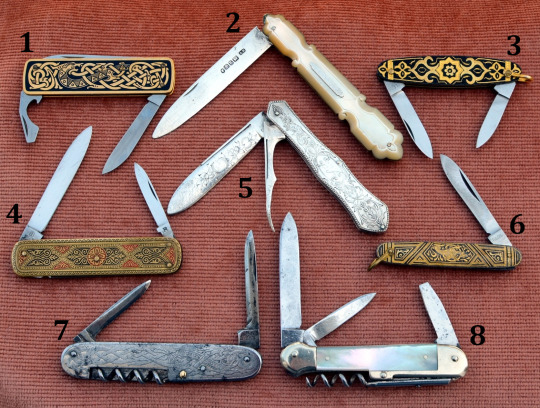
8 Fancy Pocket Knives
Etched pocket knife from Eskilstuna, Sweden
Silver / mother of pearl Victorian fruit knife, England
Damascene Toledo knife, Spain
Inlaid Toledo knife, Germany
Silver-plated fruit knife, USA
Damascene Toledo knife, Spain
Etched pocket knife from Eskilstuna, Sweden
Mother of pearl pocket knife from Eskilstuna, Sweden
@victoriansword [details after the cut]
1) Swedish pocket knife by EKA (Eskilstuna Kniffabriks AB), c. 1980-2000. Model 6 GS (1967-2010), with main blade, bottle opener/screwdriver, pen blade, and nail file. Tang stamp "EKA / SWEDEN" (from 1967), etched handle, 7 cm closed.
These were very popular in the 2nd half of the 20th century as gift knives or advertising knives. They were manufactured by many cutlers in Eskilstuna, and widely exported. The decorative pattern appears, with variations, on Swedish knives from at least the 19th century, and is inspired by Norse / Viking art, which often features twisted serpents/dragons. The interlacing perhaps also borrows from Celtic knots.
2) English fruit knife by Martin Bros & Co, 1848. Silver blade with 4 hallmarks (for Queen Victoria, the year, sterling silver, and Sheffield) and maker's mark, mother of pearl scales, 9.5 cm closed.
This is the posh version of what used to be an incredibly useful tool, a knife (and sometimes a multi-tool knife and fork) for eating on the road. The fancier ones were also status symbols, and very popular gifts – millions of silver fruit knives were manufactured in Britain from the 18th to the 20th century, mostly in Sheffield, Birmingham, and Edinburgh.
3) Spanish Toledo knife, as it's sometimes called, a damascened penknife of recent manufacture. Two pen blades, tang stamp "TOLEDO", 6.7 cm closed.
Not to be confused with Damascus blades! The handle is damascened – decorated with gold inlaid into oxidized steel (see here for details). Reminder that gold is a highly ductile metal (you can stretch it real thin before it breaks), so that impressive aesthetic result comes from a tiny amount of gold. It's a cheap knife, is what I'm saying, for tourists basically.
4) German pocket knife, confusingly also called Toledo, by Hartkopf. With main blade, pen blade and nail file. Brass handle inlaid with oxidised steel. Tang stamp "Hartkopf&Co / Solingen", 8cm closed.
It's "damascened" in the broad sense of inlaying, hence the name "Toledo": it supposedly emulates the Spanish style, and perhaps pretends to be Spanish, but both the metals and the geometric patterns are different. Knives of this type were popular in Germany all through the 20th century as gifts and advertising knives.
5) American fruit knife by William Rogers Mfg, made in Hartford, Connecticut c.1865-1898. Main blade, seedpick [also called nut-pick or nut-picker *snickers*], silver-plated nickel silver, decorated with flowers and apples. Tang stamp: an anchor logo and "Wm ROGERS & SON AA", 8.2 cm closed.
Sometimes fruit knives like this were bought by fruit shops/groceries (relatively fancy ones, presumably) in bulk, and sold or given to customers as gifts.
6) Spanish Toledo penknife (another one). With pen blade and damascened handle, different pattern, probably a bit older. Tang stamp again "TOLEDO", 6.8 cm closed.
7) Swedish pocket knife by Emil Olsson, c. 1920-1950. Blade, pen blade and corkscrew. Tang stamp "EMIL OLSSON / [star logo] / ESKILSTUNA", 9.2 cm closed.
Another etched serpent pattern on the handle, though by now you have to squint to see it. This knife has seen some shit. Until ~1940, pocket knives were widely sold and used in Sweden because they came with corkscrews, and all the bottles had corks, and everyone needed to open bottles. After the war, bottle caps replaced corks for everything except wine, and the pocket knife's utility plummeted, and cutleries started closing. There used to be hundreds, and by now only EKA's left. So statistically, if it's from before ~1950 it saw a lot of use, and if it's after ~1950 it did not, it was a gift or something.
8) Swedish pocket knife by EKA, c.1935-1965. Model 38 PB, with blade, pen blade, flat screwdriver, and corkscrew. Handle with mother of pearl scales and nickel silver bolsters, tang stamp "E.K.A. / ESKILSTUNA / SWEDEN", 8.3 cm closed.
The corkscrew is a quirky one, known as Gottlieb Hammesfahr patent: it pivots on the pin and opens perpendicular to the handle, not pulled downwards as in most pocket knives.
#tools of the trade#folding knife#sweden#sheffield#spain#germany#toledo#eskilstuna#solingen#usa#trs#trp#trc#how to stab#<- the knife nerd tag
37 notes
·
View notes
Text
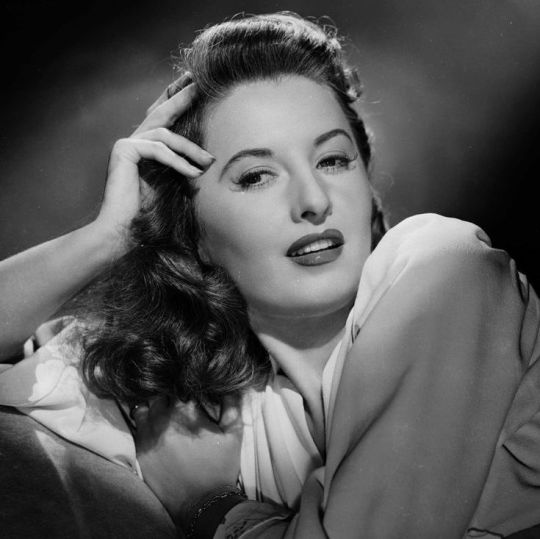
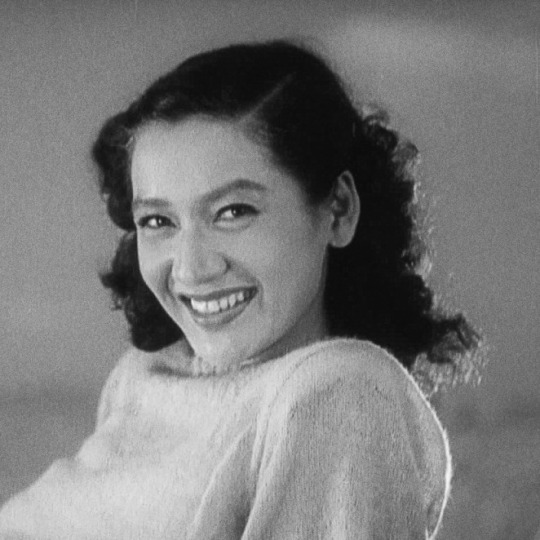
Propaganda
Barbara Stanwyck (Ball of Fire, The Lady Eve, Double Indemnity)—I hope someone else has submitted better propaganda than I because I don't want my girl's prospects to rest on me just yelling PLEASE VOTE FOR MY TERRIBLE HOT GIRLFRIEND. She is a delight in everything! She is often a sexy jerk! (It's most of the plot of Baby Face!) Even when she plays a "good girl" (as an example, Christmas in Connecticut, which more people should see) she's still kind of a jerk and I love her for it! She won't take men's shit and she sure wouldn't take mine!
Setsuko Hara (Tokyo Story, Late Spring, The Idiot)— "'The only time I saw Susan Sontag cry,' a writer once told me, his voice hushed, 'was at a screening of a Setsuko film.' What Setsuko had wasn’t glamour—she was just too sensible for that—it was glow, one that ebbed away and left you concerned, involved. You got the sense that this glow, like that of dawn, couldn’t be bought. But her smiles were human and held minute-long acts, ones with important intermissions. When she looked away, she absented herself; you felt that she’d dimmed a fire and clapped a lid on something about to spill. Over the last decade, whenever anyone brought up her lips—'Setsuko’s eternal smile,' critics said, that day we learned that she’d died—I thought instead of the thing she made us feel when she let it fall." - Moeko Fujii
This is round 4 of the tournament. All other polls in this bracket can be found here. Please reblog with further support of your beloved hot sexy vintage woman.
[additional propaganda submitted under the cut.]
Setsuko Hara:
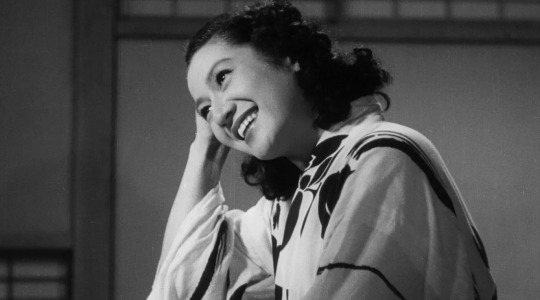
One of the best Japanese actresses of all time; a symbol of the golden era of Japanese cinema of the 1950s After seeing a Setsuko Hara film, the novelist Shūsaku Endō wrote: "We would sigh or let out a great breath from the depths of our hearts, for what we felt was precisely this: Can it be possible that there is such a woman in this world?"

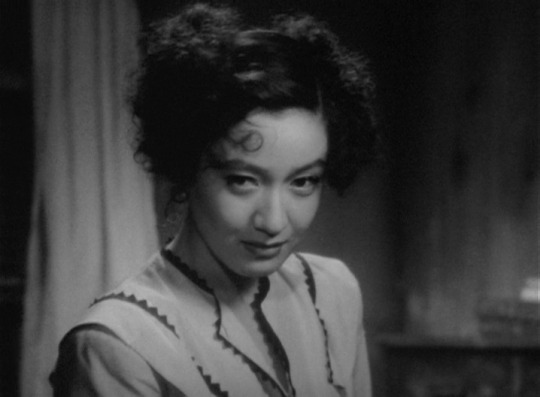
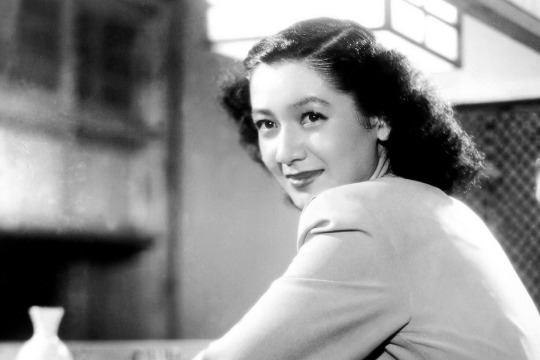
One of the greatest Japanese actresses of all time!! Best known for acting in many of Yasujiro Ozu's films of the 40s and 50s. Also she has a stunning smile and beautiful charm!
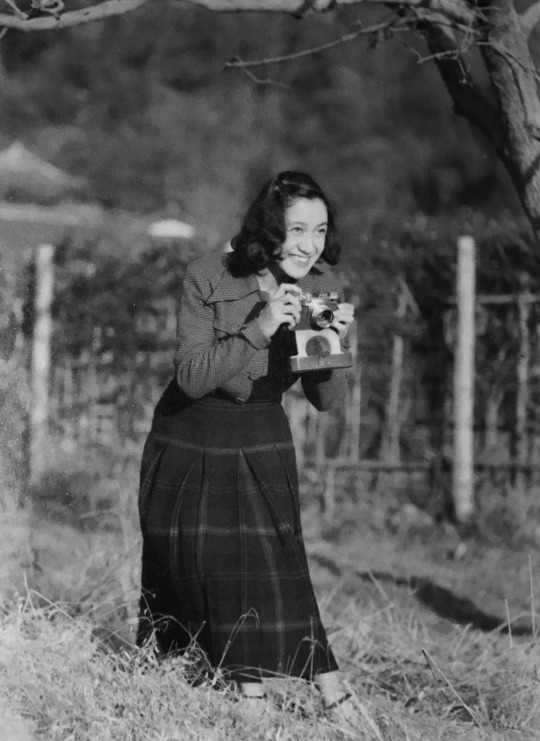
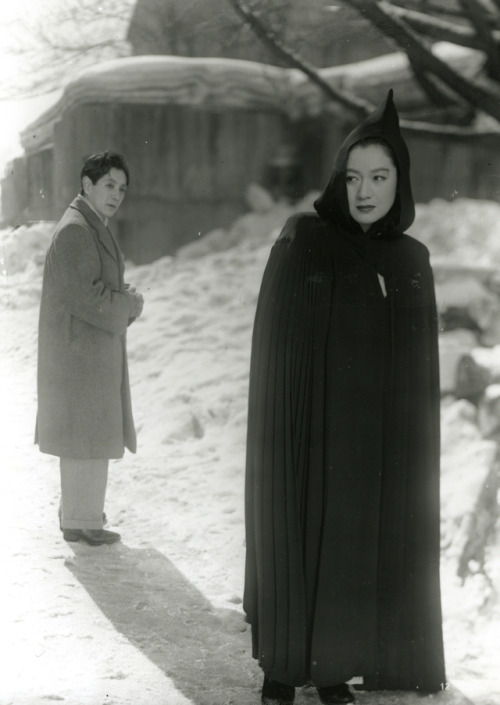
Linked gifset
Linked gifset 2
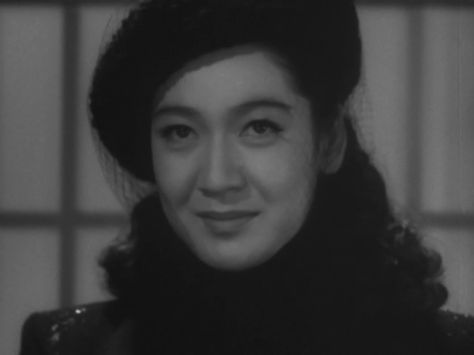
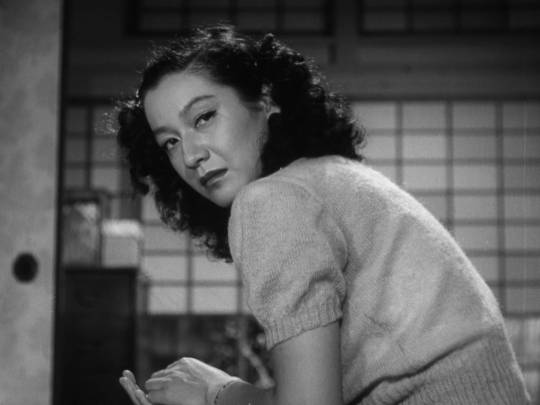
She's considered by some to be the greatest Japanese actress of all time! In Kurosawa's The Idiot she haunts the screen, and TOTALLY steals the show from Mifune every time she appears.
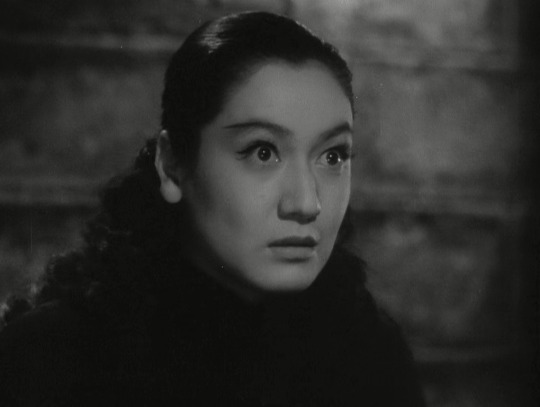
She's considered by some to be the greatest Japanese actress of all time! In Kurosawa's The Idiot she haunts the screen, and TOTALLY steals the show from Mifune every time she appears.
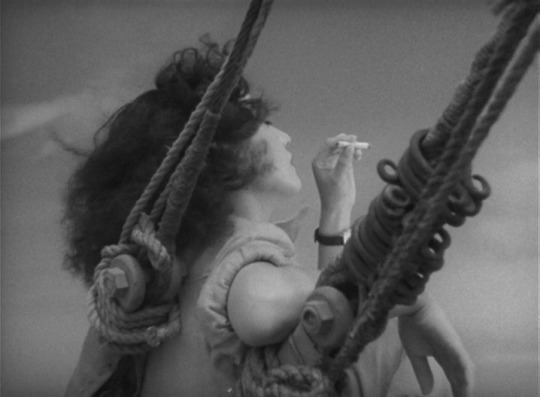
"No other actor has ever mastered the art of the smile to the same extent as Setsuko Hara (1920–2015), a celebrated star and highly regarded idol who was one of the outstanding actors of 40s and 50s Japanese cinema. Her radiant smile floods whole scenes and at times cautiously undermines the expectations made of her in coy, ironic fashion. Yet her smile's impressive range also encompasses its darker shades: Hara's delicate, dignified, melancholy smile with which she responds to disappointments, papers over the emotions churning under the surface, and flanks life's sobering realizations. Her smiles don't just function as a condensed version of her ever-precise, expressive, yet understated acting ability, they also allow the very essence of the films they appear in to shine through for a brief moment, often studies of the everyday, post-war dramas which revolve around the break-up of family structures or the failure of marriages. Her performances tread a fine line between social expectation and personal desire in post-war Japan, as Hara attempts to lay claim to the autonomy of the female characters she plays – frequently with a smile." [link]
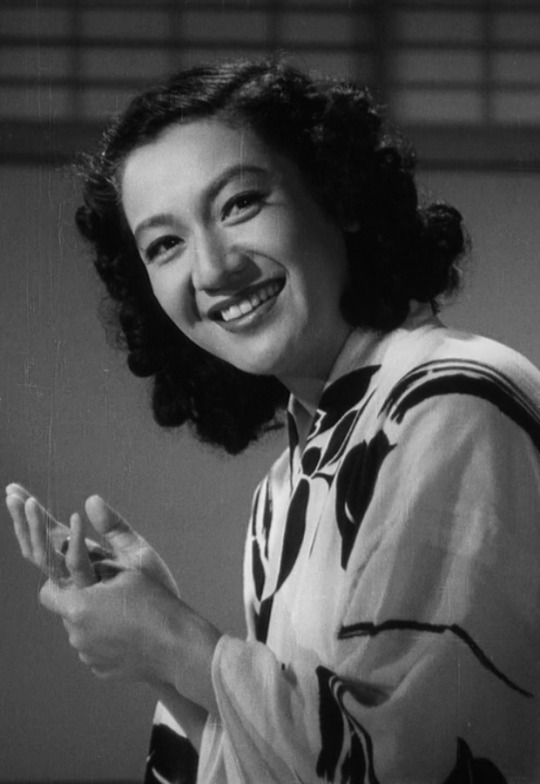
Leading lady of classic Japanese cinema with a million dollar smile
Maybe the most iconic Japanese actress ever? She rose to fame making films with Yasujiro Ozu, becoming one of the most well-known and beloved actresses in Japan, working from the 30s through the 60s in over 100 hundred. She is still considered one of the greatest Japanese actresses ever, and in my opinion, just one of the greatest actresses of all time. And she was HOT! Satoshi Kon's film Millennium Actress was largely based on her life and her career.
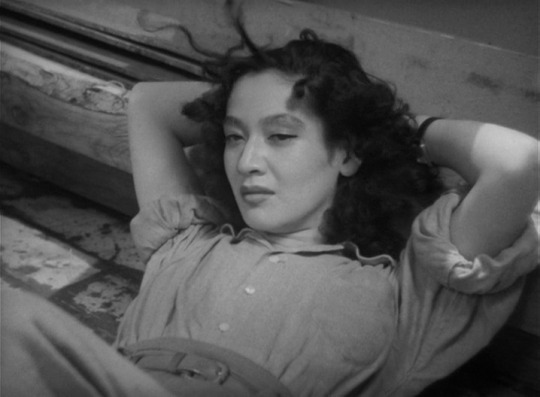
Barbara Stanwyck:
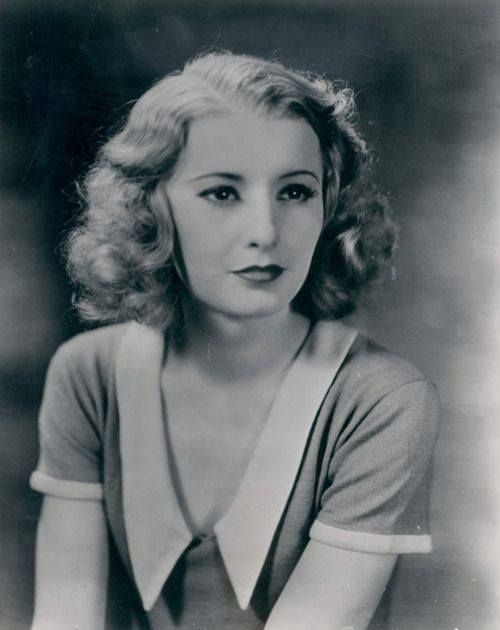
"THE leading lady of the golden age of hollywood. One of the only actresses to work independent of a studio, making short-term contracts that enabled her to make movies wherever she wanted. She had so much range, and could act in basically any genre. She's been rumored to be a lesbian literally since she was active in Hollywood; most notable is the rumor that she had a long time on-and-off relationship with famously bi Joan Crawford, her "best friend" for decades (They lived right next door to one another). She also lived with Helen Ferguson, her "live-in publicist" for many years. She was the quintessential femme fatale in Double Indemnity, and really pushed sexual boundaries in her pre-code films like Baby Face, and the famous screwball The Lady Eve, where she plays basically a downlow domme. Allegedly, when a journalist asked her if she was a lesbian, she straight up threw him out of her house. She even played a lesbian in Walk on the Wild Side"
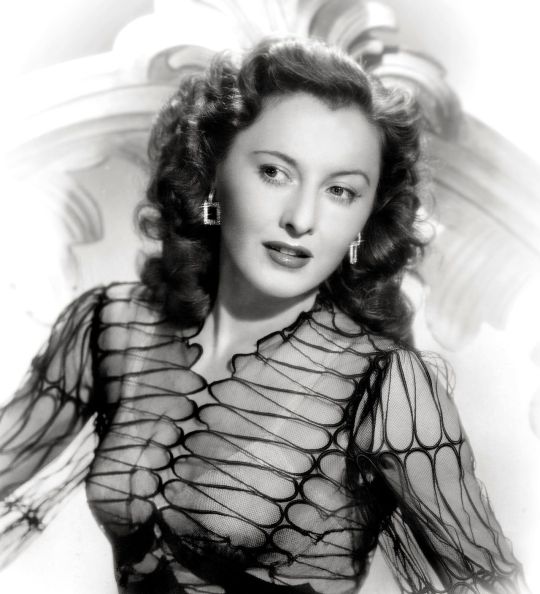
"THE queen of screwball comedies. I adore her, I'd kill for her, I will cry if she's not gonna win this poll."

"listen ok she had awful politics she was a mccarthyist right wing wacko BUT she's so incredibly hot that i've deluded myself into believing i could fix her. if you see her onscreen she carries herself in a way that's just so effortlessly sexy AND she has just a stunning face. imo she was at her hottest in the 1940s but even as early as the late 1920s she had a rly captivating screen presence and just a beautiful face, and then post-1950 she was just irresistibly milfy so really she was just always incredibly hot. she was also an incredibly talented actress who was equally stellar in melodrama, film noir, and unhinged screwball comedy. the blonde wig they made her wear in double indemnity is notoriously silly looking but she still looks sexy in it so that's gotta count for something. i've watched so many terrible movies just for a chance at seeing her that i think her estate should be paying me damages."
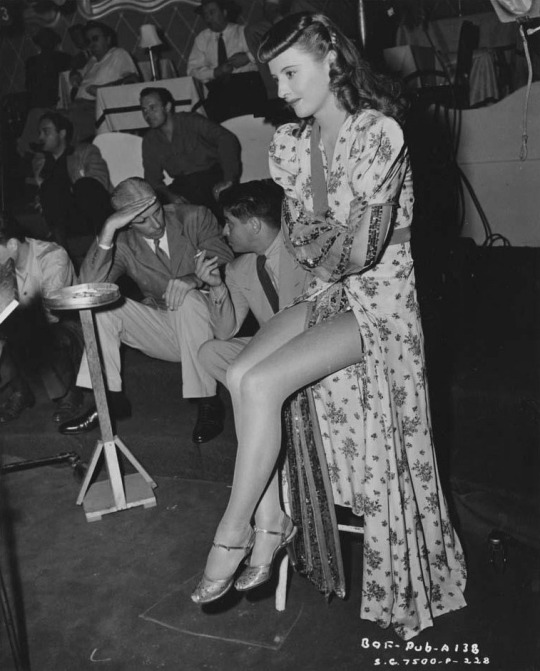
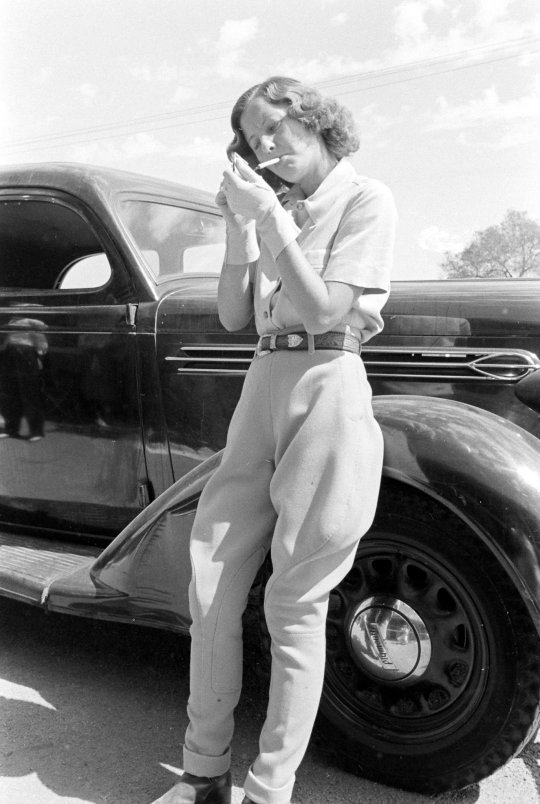
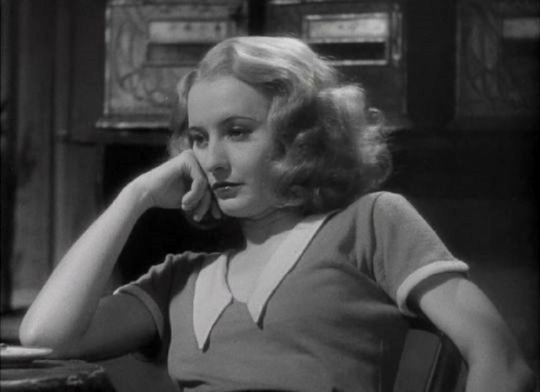
"Not often thought of for her sultriness, Barbara Stanwyck was incredible in that she could actually choose to be hot if the role called for it, and then have a glow-down to look ordinary for another role. She wasn't the most beautiful or effervescent, but damn did she have rizz. Watch her with Gary Cooper in Ball of Fire teaching him about "yum-yum" or with Henry Fonda in The Lady Eve whispering huskily into his ear."
youtube
"She is always the smartest woman in the room. Watching her play Henry Fonda like a befuddled fiddle in The Lady Eve was a highlight of my life. Femme fatale in Double Indemnity, comedy queen in Ball of Fire. She can do anything."
"She was part of my gay awakening"
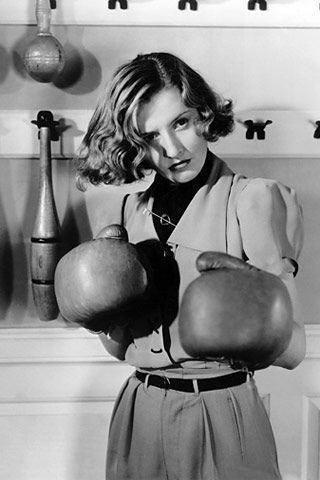
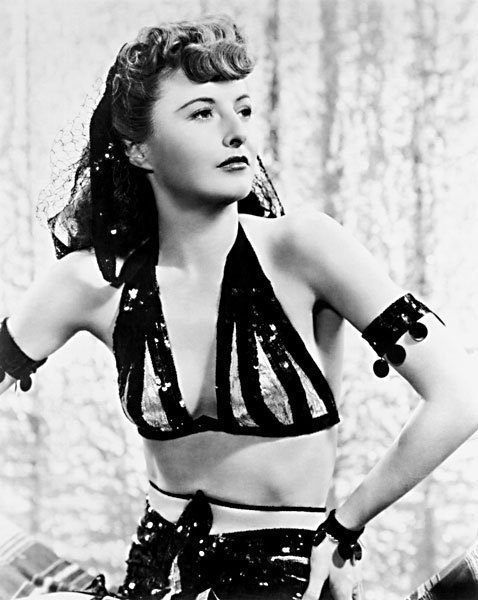
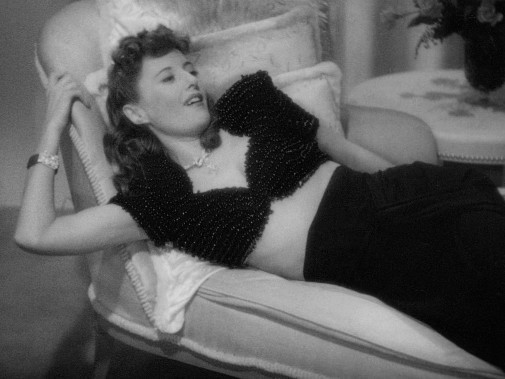
"SHE'S A PRE-CODE QUEEN. She did everything, drama, comedy. The most beautiful woman in the world to watch weep. Beg for to step on you with those legs. Fun Babs story: Ginger Rogers was offered the role in Ball of Fire but said, “Oh, I would never play that part, she’s too common.” So they called Barbara Stanwyck and they said “We offered this to Ginger Rogers but she’s turned it down, would you be interested?” And she read the script and she said; “You bet! I LOVE playing common broads. [link]"
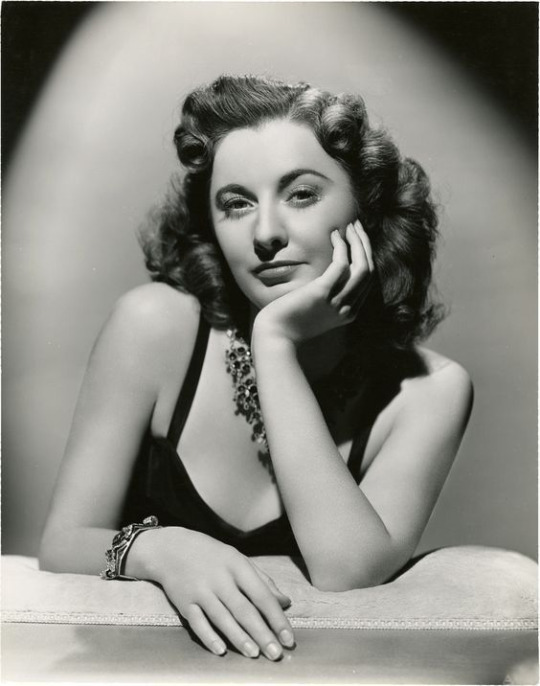
302 notes
·
View notes
Text
My DC Cinematic Universe - Creature Commandos: Part V
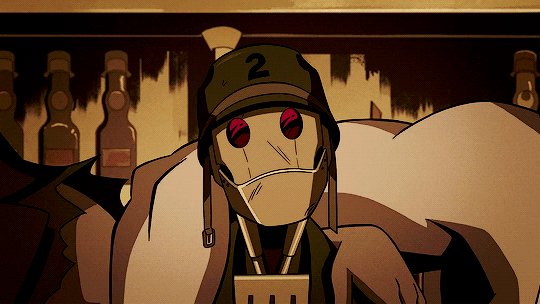
Chapter Five: Cheers to the Tin Man
Y'know, I had a few ideas for titles of this essay, but this is honestly the perfect title, which is probably why Episode Three of the series also has it. Cheers to the Tin Man is far-and-away my favorite episode of the series, because it's honestly just a hell of a lot of fun, and justifies the Creature Commandos in this universe by making them terrifyingly (and mostly realistically) effective, while also giving us the backstory of one of its best-executed characters: G.I. Robot.
Like the Frankensteins in the last essay, I won't waste time and say that G.I. Robot was always going to make it into my version of the Creature Commandos. He's one of my favorite Weird War characters, and the idea of an automated soldier is gold, both for creativity and comedy, as this series proves. Unlike the Frankensteins, I think Gunn nailed this character, and honestly gave him more dimension than I would've expected from this character. This is an example of a character with little-to-no personality in the comics, elevated to his best possible form. God, I can't speak highly enough of this guy, and this'll be the complete opposite of the last essay.
Of course...the episode isn't perfect. But we'll get there. For now, let's actually go through this episode, because there are a slew of other characters and references here that flesh out the universe, also making this one of the more important episodes of the season. But yeah, let's start with the Tin Man himself.

First appearing in Star-Spangled War Stories #101 in 1962, the first G.I. Robot had a name: "Joe". A functional prototype, this robot responded to commands, and was sent into the field on a test run with a necessary human handler, a private named Mac. To test this machine, the creator, Professor Zurin, sent the duo to a super-safe testing area: an island full of still-surviving dinosaurs. Yeah, uh, Dinosaur Island is a major feature of 1950s DC, and is a central part of a period known as "The War Time Forgot." And, oh, don't worry: I'll be revisiting Dinosaur Island very thoroughly at a later date. With that said, the two survive their encounter, with G.I. Robot interpreting (and sometimes misinterpreting) Mac's commands, and saving him on multiple occasions. But Joe, as a prototype, would only last a few issues.
The next G.I. Robot was nicknamed "Mac", in honor of the prototype's handler. This one was also sent to Dinosaur Island, this time with a new helper named Reed, and the two had the same kind of shenanigans, with an improved response to commands in Mac as compared to Joe. However, this iteration died on his first seen mission, saving Reed in the process. And, heads-up, G.I. Robot getting destroyed is a trend throughout his comic book history. That may come back into play later. At this point, though, in 1966, the last story about a G.I. Robot is published for years, until Weird War Tales #101 in 1981. This time, he's not a prototype...and he's fit for war.

20 years later, G.I. Robot comes back in a story written by Ross Kanigher, who also invented the previous two iterations, and had obviously been trying to get this character to catch on. Guess he saw the opportunity, and decided to throw him into actual war. This iteration, named J.A.K.E. (Jungle Assault Killer Experiment), was now invented by...Myron Mazursky. Oh, HOOOOO, now that's an interesting connection, isn't it? Now, to be fair, having Mazursky be both a biochemist and a mechanical/software engineer is...silly. Even for comic book standards. However, the other person involved in making G.I. Robot is Charles Grayson, who absolutely makes sense in this role. A relative of the original Robin, Dick Grayson (yes, REALLY), Chuck was also the assistant to another prominent World War II era scientist, Robert Crane. Crane would be in an accident, forcing his brain to go into a mechanical body, and becoming the first Robotman in the process. So, yeah, Grayson had some experience.
G.I. Robot, therefore, was a part of Project M, the think tank responsible for the Creature Commandos, establishing that link. There's more to this story, but just know that J.A.K.E. was sent out outfitted with multiple weapons, and with new human handler Sgt. Coker. The two had several mission in the South Pacific campaign of World War II, mostly fighting the Japanese forces, until J.A.K.E.'s destruction in 1943 via self-sacrifice. Again. There's a trend here. A second G.I. Robot, J.A.K.E. II, was built afterward, and accompanied by a robotic companion, C.A.P.D.. This version of the character would eventually team up with the Creature Commandos in earnest, all of whom were stationed on Dinosaur Island during the latter days of the war. Afterwards, he would be silently decommissioned in 1945, but would survive into the present day this time! But, he would have very few appearances, and would return during the New 52 era with a whole new backstory. Now. Allow me to show you one of the best comic book pages I've ever seen.

Again. You see why I'm pissed about Frankenstein's Monster's treatment in Creature Commandos. Jesus. Anyway, this badass image comes from Men of War #8, the last issue of a series rebooted from a 1970s war series, and starring Frankenstein's Monster during World War II. And it is chock-full of badass images of Frankenstein's Monster that just make me upset when I think of Creature Commandos. But the most relevant point here is that scientist Robert Crane is kidnapped by the Imperial Army of Japan, and the Bride rescues him, only for him to reveal that he's already been forced to build a weapon for them, and it's ready for war.

The Japanese Attack Killer Elite Robot, AKA J.A.K.E., is sent after the allies to fight. However, when it goes after a submarine that Frank is in, he LAUNCHES HIMSELF AS A TORPEDO AT HIM UNDERWATER, GOD GUNN DID HIM SO DIRTY!!! Crane reverses the Robot's alliance (because why not), and he becomes the Joint Allied Killer Elite Robot instead, AKA G.I. Robot. And then, he punches a kaiju in the face, because this comic is both ridiculous and amazing. After this mission, G.I. Robot survives at least until the Korean War, where he teams up once again with Frank. Honestly, awesome. Gruesome, but a hell of a character legacy.
Although, to be fair, it wasn't over. G.I. Robot appeared once again in a...really odd limited series that I'd never heard of before writing this post. One-Star Squadron starred a number of new or D-class heroes running Heroz4U, a gig-economy superhero hiring platform that has heroes work as telemarketers, security guards, birthday party entertainers...Cameo appearances, yes, ACTUALLY? It's definitely a joke series, but the main roster includes Red Tornado, Power Girl, Flying Fox, Heckler, Gangbuster, and...G.I. Robot. And here's the thing: it's such an odd series, and everybody is SO out-of-character, I don't think this can be considered canon. It's definitely a satire, and a good one, but there's no way it's canon. Look, I'm mentioning it o be a completionist, but it's going to be completely ignored by the annals of time. Not a great series, and incredibly odd in several ways for several characters. Plus, uh...G.I. Robot looks like this. Nightmare fuel.

Now, G.I. Robot's been adapted a couple of times, namely in Batman: The Brave and the Bold and, of course, Creature Commandos. Both series sets his origins and actions in World War II, and funnily enough, serving with the classic comic book wartime group Sgt. Rock and the Easy Company. I'm tempted to go into Easy Company in more detail, because its a super-neat group with a long comic book history, but that may be a topic for another day. All you need to know is that Easy Company was a group of soldiers serving on every battle in the European front of World War II, and they've appeared in DC Comics and other media since 1959. Classic group, cool to see them here, especially because we might be getting a Sgt. Rock movie? That's been in development for years.
Cheers to the Tin Man opens with G.I. Robot's backstory, bringing us back to his days with Easy Company, or "his boys", who gave him the nickname "Tin Man" in the first place. And you can immediately see his connection with the group, and his prowess in fighting Nazis. It's genuinely heartwarming. Flash-forward to the 1950s or '60s (unclear), where he's on a television show showing his somewhat unhinged (and hilarious) programming, only to be watched by Will Magnus, holy shit.
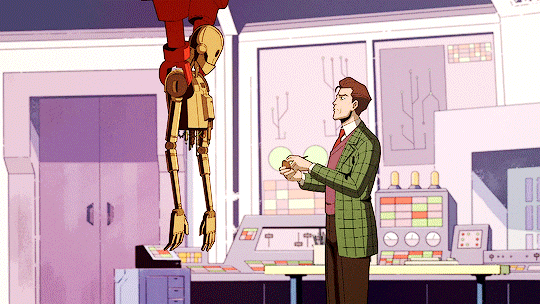
Now, not sure how I feel about time-shifting Will Magnus this far into the past, for a number of reasons, but this is incredibly exciting because of what Gunn's implying: that we'll see Magnus' creations in his DCU, those being the robotic superheroes, the Metal Men. And if there was ANY other group I'd want to hand over to Gunn from DC Comics, the Metal Men is incredibly high on the list. 'Course, this series has made that claim less enthusiastic, but I actually think Gunn would be excellent at changing the Metal Men for a modern audience, and giving some characters more depth to their purposely-simplistic personalities. Lab experiment characters, after all, seem to be Gunn's strongest point when it comes to adaptations.
Obviously, other stuff is happening in this episode's modern day, as the group realizes that Circe is headed to the palace while they're all absent to kill the Princess, and these things don't matter to me at the moment. I'll talk about Circe's nonsense plot in another essay, don't worry, but not this one. But towards the end of the episode, we see why G.I. Robot landed in prison, and in the Creature Commandos, intercut with two montages of glorious ultraviolence. In the present, G.I. Robot absolutely massacres Circe's troops at Flag's command, and it's fun seeing his upgrades as compared to World War II. In the flashback, he ended up being collected by a member of the KKK/American Nazis in Hub City (gotta assume local heroes Blue Beetle and the Question weren't around yet), with plans to use him as a weapon to do something heinous, only for him to slaughter literally all of the Nazis in the room and get arrested. We also establish that due to a previous criminal case, robots are granted human rights and accountability. Now that...is interesting. Can't wait to find out what that refers to in Gunn's DCU. Red Tornado, perhaps?
But all of this brings us to the most controversial move Gunn makes.
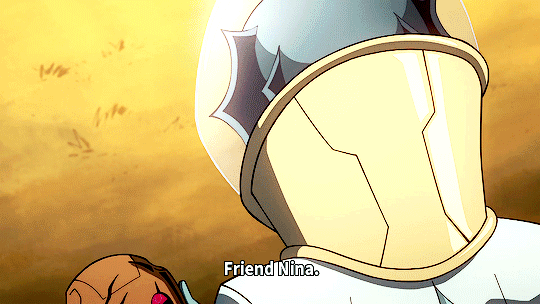
And I'm actually all for this. Kind of.
Look, I love G.I. Robot, but it's literally in his character to die. Nearly every single iteration of G.I. Robot has been destroyed at least once, only to be rebuilt and sent into commission with a new name and new identity. This is exactly what to expect from G.I. Robot. Now, should he have died in episode 3 of the series? Well, that's arguable. Unfortunately, the way this series is structured makes this the perfect story moment for him to die dramatically in order to forward the mission. Definitely made me sad, because I love this character, and Sean Gunn plays him incredibly well, but I get it.
However, this does expose a real problem with this series, and Gunn's treatment of the Creature Commandos as a group. Fact is, Gunn is still running on Suicide Squad logic. And the Creature Commandos are not the Suicide Squad. The purpose of the Creature Commandos is, yes, to get the job done, but also to use literal and psychological warfare to interfere with the enemy. It's a horror story where we're on the side of the monsters. It is not a story of a group of criminals trying to get time off of their sentence by going into impossible scenarios, in which any of them could die. That's the Suicide Squad. And the fact that Gunn is willing to kill characters like this early in the series means that we're supposed to expect at least one of our new friends to die. And of course, if you've seen the series, you know how that ends.
And, as if fulfilling an age-olf prophecy...spoilers for the finale...
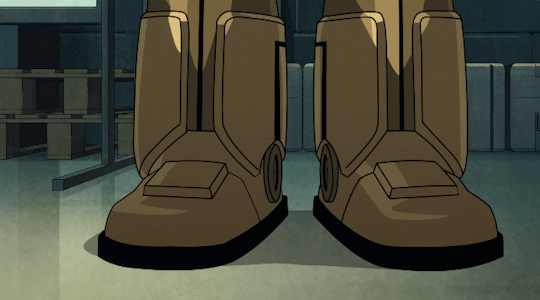
Yeah, G.I. Robot comes back. Least surprising move of the century, but an incredibly welcome one! Now in a modernized form that reminds me a bit of his Men at War/New 52 iteration, this golden dynamo is set to serve in the group for season 2, where he will probably die again, let's be honest here. But now, him dying would be a part of the joke, and will lose its gravitas as a result. Which is OK.
Fact is, I think this is the best adapted character in Gunn's series, and there isn't a hell of a lot I think needs changing, and the stuff I would change doesn't have to do with the character. Maybe push the Will Magnus timeline a couple of decades; kill G.I. Robot in the next episode by making this the eight-episode series it was clearly supposed to be; maybe get rid of Nina's maybe-romantic fascination with G.I. Robot (that went truly nowhere at all); maybe even bring the new form of G.I. Robot back during the season finale to participate in a final fight. But a lot of that is restructuring of the series as a whole, or changing characters around G.I., not G.I. himself. I actually think he's kinda perfect.
But before we sew up here, I'd like to put something forward in terms of my version of Creature Commandos. Because this episode opens up an opportunity that I'm somewhat sad wasn't actually explored: World War II.
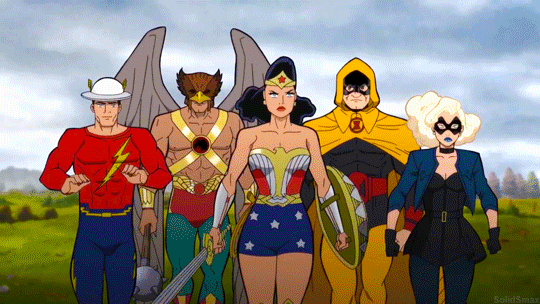
If it isn't clear by now, World War II is sort of a big deal in DC Comics, both in and out of universe. One of the reasons that DC Comics (and superhero comics in general) rose into cultural prominence in the United States, as well as being a major time period in the DC Comics universe, this is a time that has gone untouched by live-action media. And I mean that. Even the CW series barely touch World War II outside of references or the occasional alternate future. It's a black slate, because I'm not sure anybody's been able to figure it out. And it's not impossible to do, by any means; just takes some creative work.
How powerful would it be for the future of the DCU if one of the focuses of Creature Commandos was on the history of the team, rather than just the individuals. And, more importantly, this means that the Creature Commandos exist independent of the Suicide Squad, and have a different tone to them altogether. It's entirely possible, of course, that I've just predicted Gunn's plans for season 2, as he could bring in elements of the original group for the next season, with out modern Creature Commandos dealing with something from that time period. And frankly, for my version, I know exactly how I'm setting this up, but that'll be a later essay. My point is, why not use the connection to World War II, as seen with G.I. Robot (and as COULD have been seen with the Frankensteins), and give us both references to the original Creature Commandos, and the intricate history that was World War II in DC Comics. A missed opportunity, is all I'm saying here.
But regardless, that's the end of this essay; I'll elaborate more on this in the future. But next time...well, I guess it's time to talk about this character, and his confusing place in this story, as well as his genuinely interesting backstory. Next time, episode four, Chasing Squirrels, starring another of Gunn's seemingly favorite characters: Weasel.
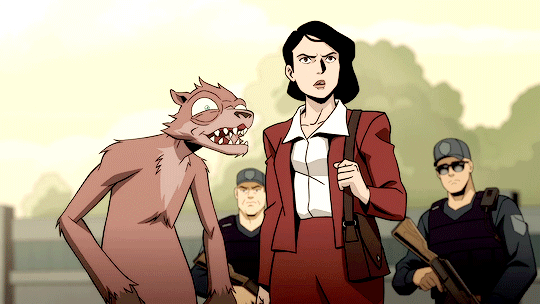
See you next time (maybe, no pressure)!
Part One: Introduction and Adaptation Part Two: The Original Creature Commandos Part Three: Amanda Waller and Rick Flag, Sr. Part Four: The Frankensteins Part Five: G.I. Robot Part Six: Weasel Part Seven: Doctor Phosphorus Part Eight: Mermaid Part Nine: Circe Part Ten: The Princess and the Monster (soon)
#dc#dc comics#dcu#dc universe#dccu#my dcu#my dccu#creature commandos#gi robot#g.i. robot#world war ii#world war 2#wwii#ww2#easy company#sgt rock#sergeant rock#will magnus#metal men#james gunn#frankenstein#frankenstein's monster
16 notes
·
View notes
Text
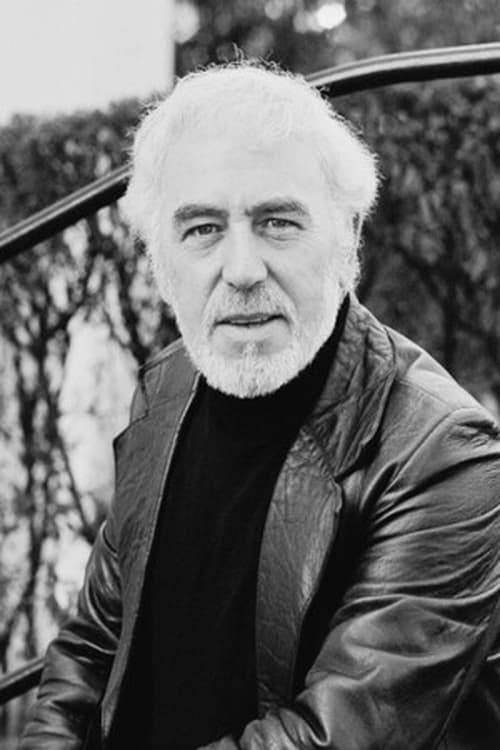
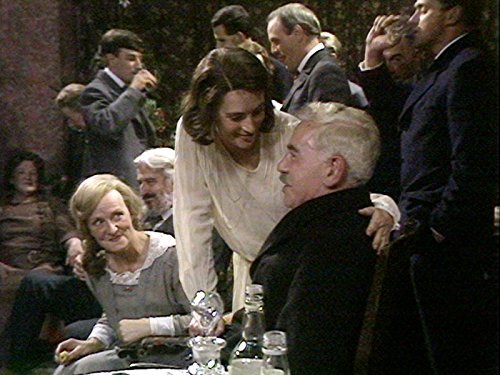
This is another in our occasional series featuring luminaries of stage and screen with a strong personal and/or professional connection with Northeast England, inspired with thanks by @robbielewis. The most recent previous instalment was on brother and sister acting duo Malcolm and Catherine Terris. This time, James Garbutt.
As with some of our previous subjects, there is an unsatisfying lack of biographical information available; James Garbutt seems to have built a solid career over decades without a high public or media profile.
He was born in Houghton-le-Spring, County Durham, in 1925. In World War Two he was an RAF pilot serving in Africa, subsequently worked as an art teacher and became a leading member of the socialist theatre company, Newcastle People’s Theatre, throughout the 1950s and 60s.
He was active in British television between 1969 and 2002, with his breakthrough role in the 1970s BBC blockbuster, The Onedin Line, replacing Brian Rawlinson for season three (only) as Robert Onedin. (It appears that Rawlinson did not want to continue in the role, but for whatever reason returned for season four and remained until they eventually killed off the character).
James Garbutt is perhaps best remembered for his intense performance as Bill Seaton, the prickly patriarch of the Seaton family and veteran pitman who is paralysed in an underground accident, in 39 episodes of the Tyneside social realism drama, When the Boat Comes In (1976-77).
Amongst over 60 recorded screen credits, his other television appearances include three episodes of Doctor Who (Genesis of the Daleks, 1975), Z Cars, Whatever Happened to the Likely Lads, Middlemarch, The Bill, the political drama Bill Brand, and three separate characters over eight episodes of Coronation Street between 1970 and 1997. He also appeared in the Superman: The Movie (1978), starring Christopher Reeve.
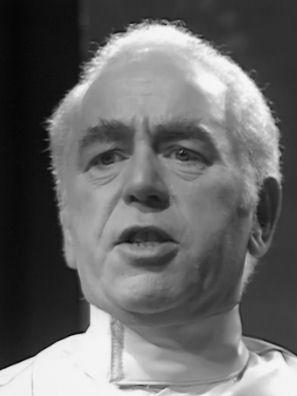
About to bite the dust courtesy of the Daleks in Doctor Who
In addition to his work for the Newcastle People’s Theatre, his stage appearances include several productions for the Royal Shakespeare Company, including the stage version of Our Friends in the North which preceded the hit televisions series, for the Leeds Theatre Trust, Alexandra Theatre (Birmingham) and Tyneside Theatre Company.
He passed away in 2020, aged 94.
#social history#uk politics#working class history#social justice#british culture#british actors#british theatre#british television#northeast england#geordie#county durham#doctor who#coronation street#when the boat comes in#the onedin line
18 notes
·
View notes